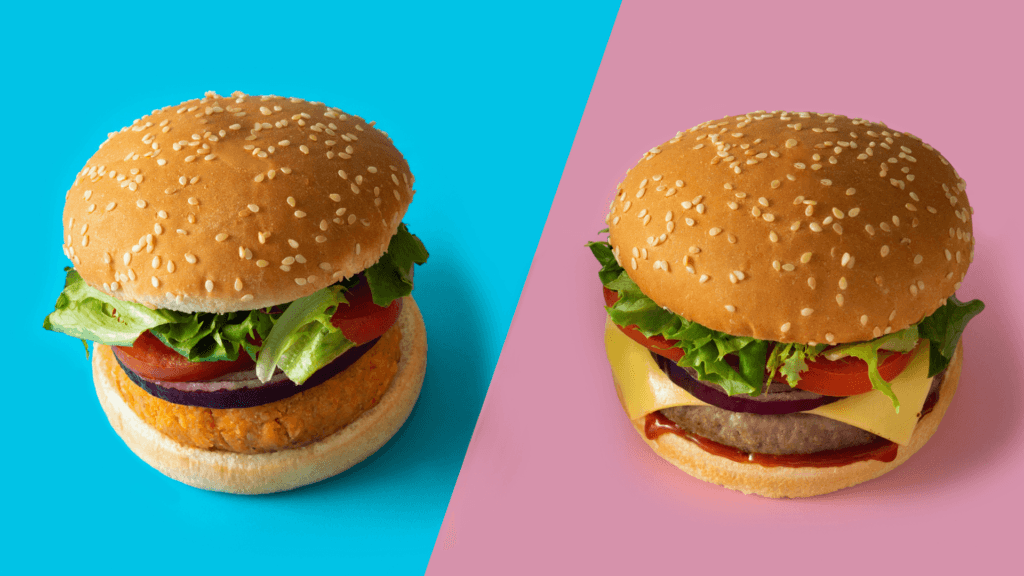Why Make Vegan Food Swaps?
I used to think going vegan meant boring salads and missing out on my favorite foods. But with the right vegan food swaps, I found new ways to enjoy the meals I love. These swaps make eating plant-based easy, healthy, and better for the planet.
In this post, I’ll share the best vegan swaps based on what’s easy to find and good for you.
Health Benefits of Plant-Based Alternatives
Plant-based foods are naturally low in saturated fat and cholesterol-free, making them heart-friendly. Plus, they help you sidestep some of the health risks linked to meat—here’s what you should know.
They’re also full of fiber, vitamins, and minerals. Soy milk, for example, has just as much protein as dairy. And lentils have more fiber than beef, making these vegan food swaps smart and nutritious choices.
Best Vegan Dairy Swaps: Creamy, Healthy, Planet-Friendly
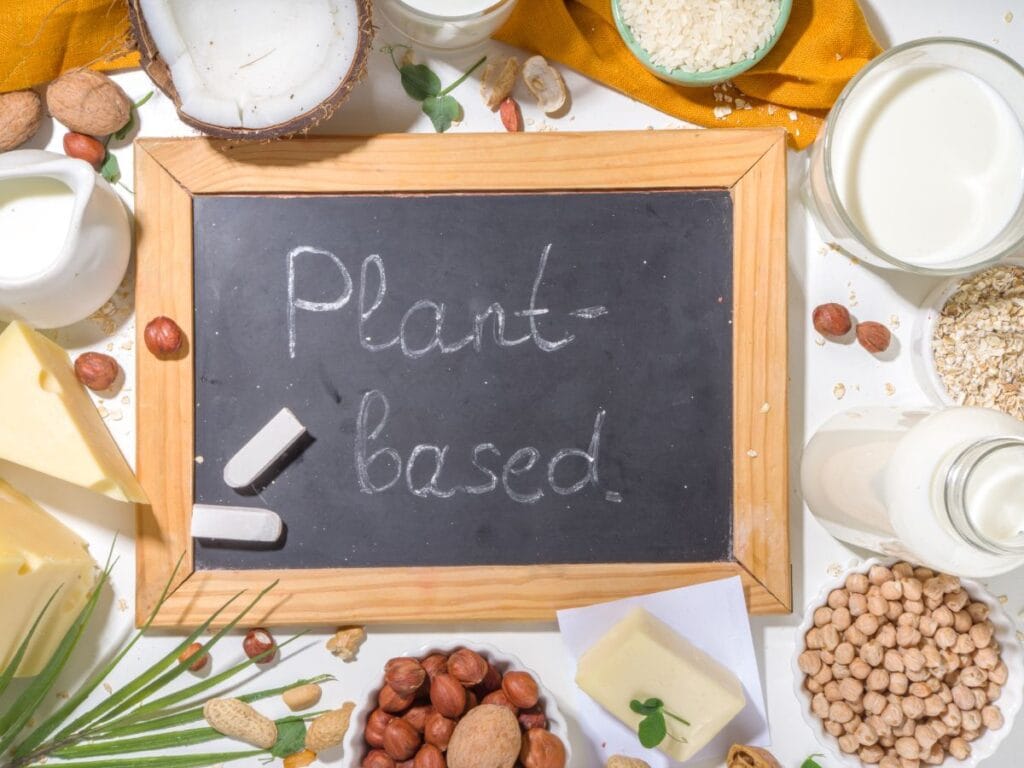
Switching from dairy to plant-based milk is better for you and the planet. Some options have more calcium and fewer calories than cow’s milk.
These vegan food swaps are an easy way to support your health and live more sustainably.
Health Benefits of Plant-Based Milks

Plant-based milks are full of nutrients. Fortified options like almond milk often have more calcium than cow’s milk—up to 450mg per cup. They’re also free from cholesterol and the fortified options can be high in vitamins like B12 and D.
These vegan food swaps support heart health and add variety to your diet.
Top Vegan Milk Alternatives
Almond Milk: Light and Nutty
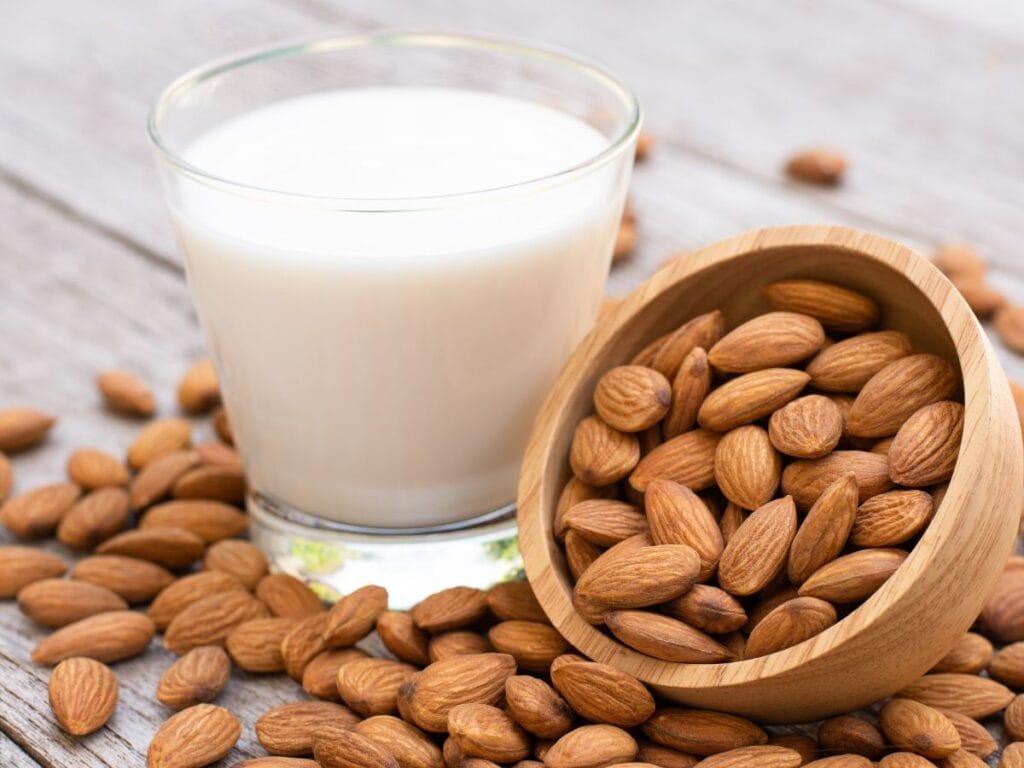
Almond milk is very low-calorie, containing only 30–40 calories per cup. Plus, it has a pleasant nutty flavor.
Fortified versions are even better. They offer 300–450mg calcium per cup. This often beats dairy’s 300mg content. Additionally, you get 5.3mg vitamin E as a bonus.
However, protein content is low at just 1g. Despite this, it’s perfect for smoothies or cereal.
Oat Milk: Creamy Coffee Companion
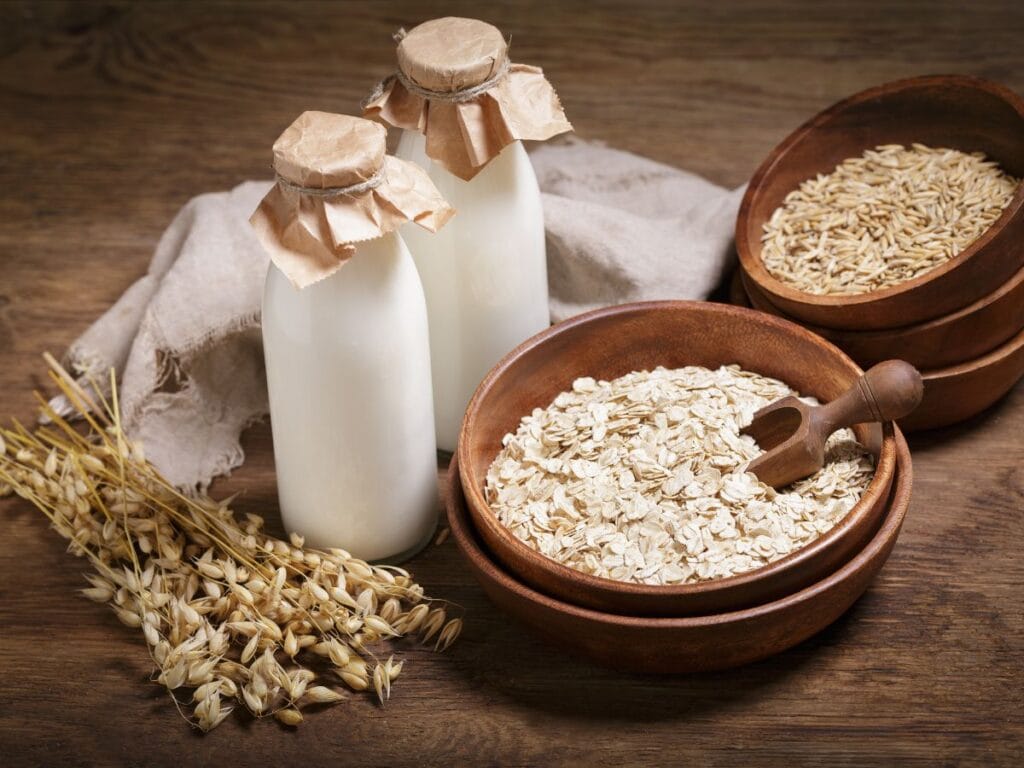
Oat milk contains 90–130 calories per cup. This is 15–40% less calories than dairy milk.
Moreover, it adds 2–4g fiber. Remember, dairy has no fiber at all. Fortified options also match dairy’s calcium content. Some even exceed dairy’s 300mg calcium.
Carbs are higher at 16–25g. This compares to dairy’s 12g. Also, protein is lower at just 2–4g.
Soy Milk: Protein Powerhouse
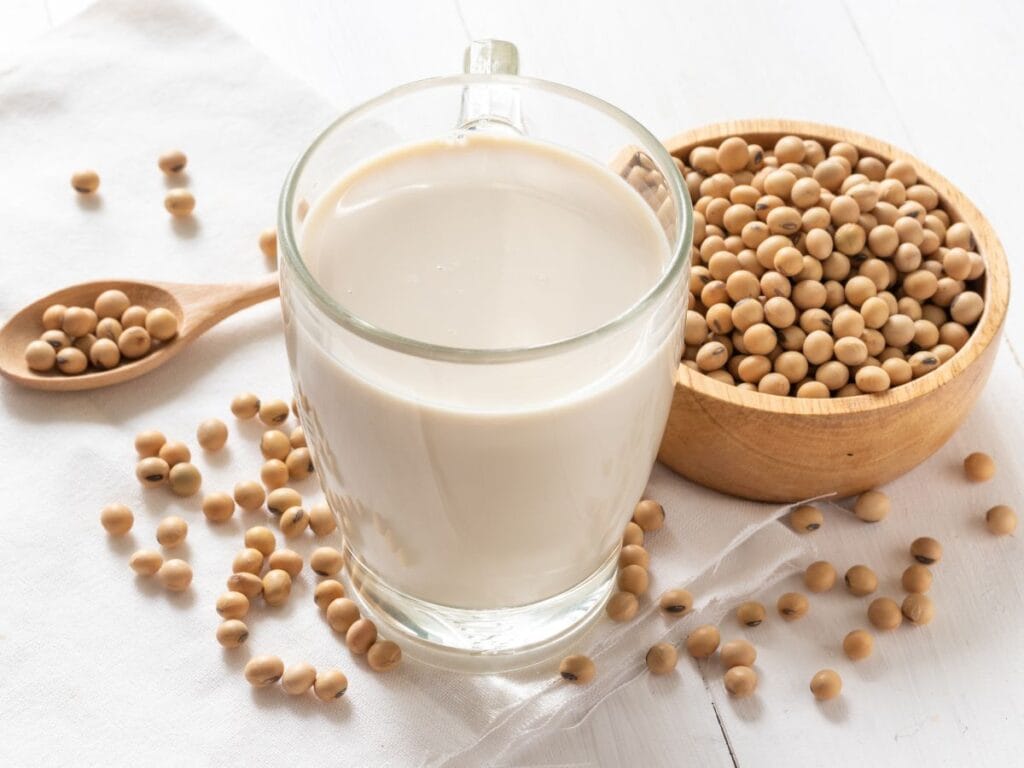
Soy milk nearly matches dairy’s protein content. Specifically, you get 7–8g protein per cup. This compares to dairy’s 8g.
The calorie count is impressive too. Soy milk contains 80–100 calories per cup. That’s 33–47% less than dairy milk. Meanwhile, calcium content reaches 300–450mg.
Isoflavones are present at 10mg per cup. These compounds might reduce heart disease risk by 10%. Also, carbs stay low at just 3–4g.
However, there’s one downside. Some people dislike the ‘beany’ taste. Despite this, it’s ideal for protein-packed recipes. It’s important to try different brands of soy milk as each brand can taste vastly different.
Nutrient Trade-Offs in Plant-Based Milks
No plant-based milk is perfect. Each has unique characteristics. Protein’s the main gap: almond and coconut hover near 1g. Meanwhile, dairy offers 8g protein. Therefore, soy’s your best protein vegan food swap.
Coconut milk’s saturated fat can rival dairy. However, almonds contains zero saturated fat. Always choose fortified plant milks with calcium, vitamin D, and B12.
How to Choose the Best Plant-Based Milk
Picking the right milk can feel overwhelming, but it’s manageable with a plan. Here’s a quick guide:
- Check Fortification: Ensure calcium, vitamin D, and B12 are on the label.
- Match Your Needs: Want protein? Pick soy. Need low carbs? Go almond.
- Taste Test: Try brands—Oatly’s creamy, Alpro’s nutty.
- Eco-Check: Oat and soy are greener than almond [Green et al., 2023].
Best Vegan Cheese Swaps: Creamy, Guilt-Free, Planet-Loving
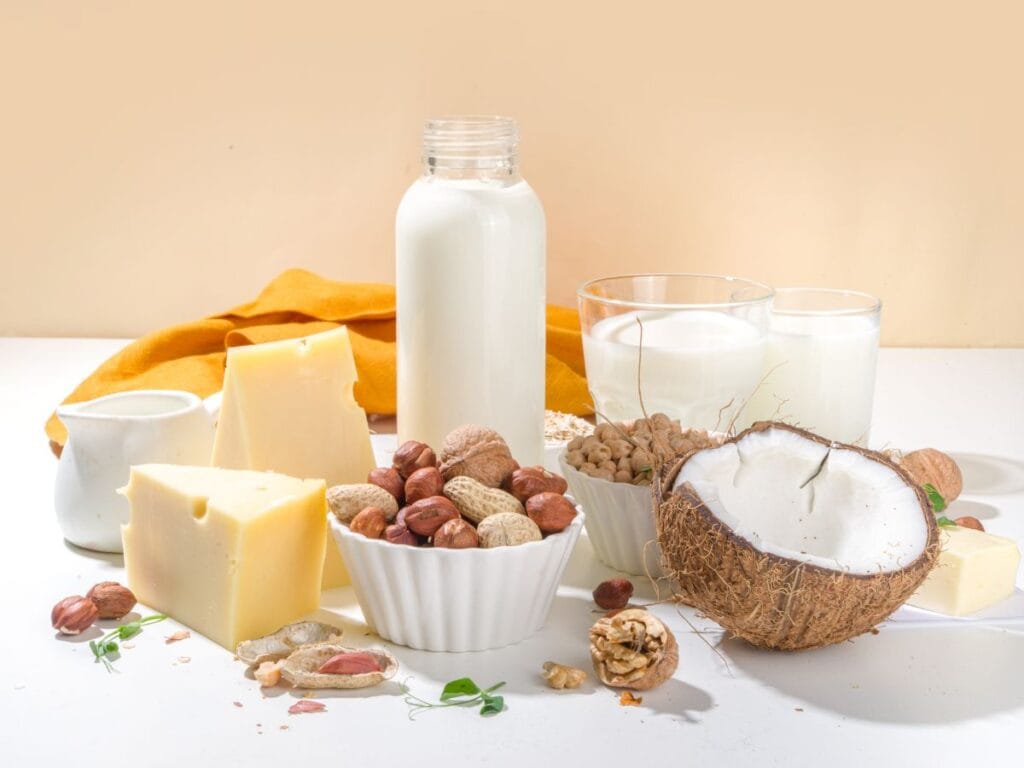
Craving cheese but want to ditch dairy? Vegan cheeses are your ticket to sustainable, healthy eating without sacrificing that melty, savory vibe. Surprisingly, many outshine cheddar’s nutrition while cutting environmental impact.
Let’s explore why these alternatives are a game-changer for your vegan journey. From nutty cashew spreads to tofu ricotta, I’ll share nutrient wins, trade-offs, and tips to keep your taste buds happy.
Health Benefits of Plant-Based Cheese
Some vegan cheeses have the potential to boost your health. Fortified options offer 200–450mg calcium per ounce, matching or surpassing cheddar’s 200mg. Some are cholesterol-free and many include vitamin B12 and iron for a nutrient edge.
Top Vegan Cheese Swaps
Nutritional Yeast: Cheesy Umami Magic
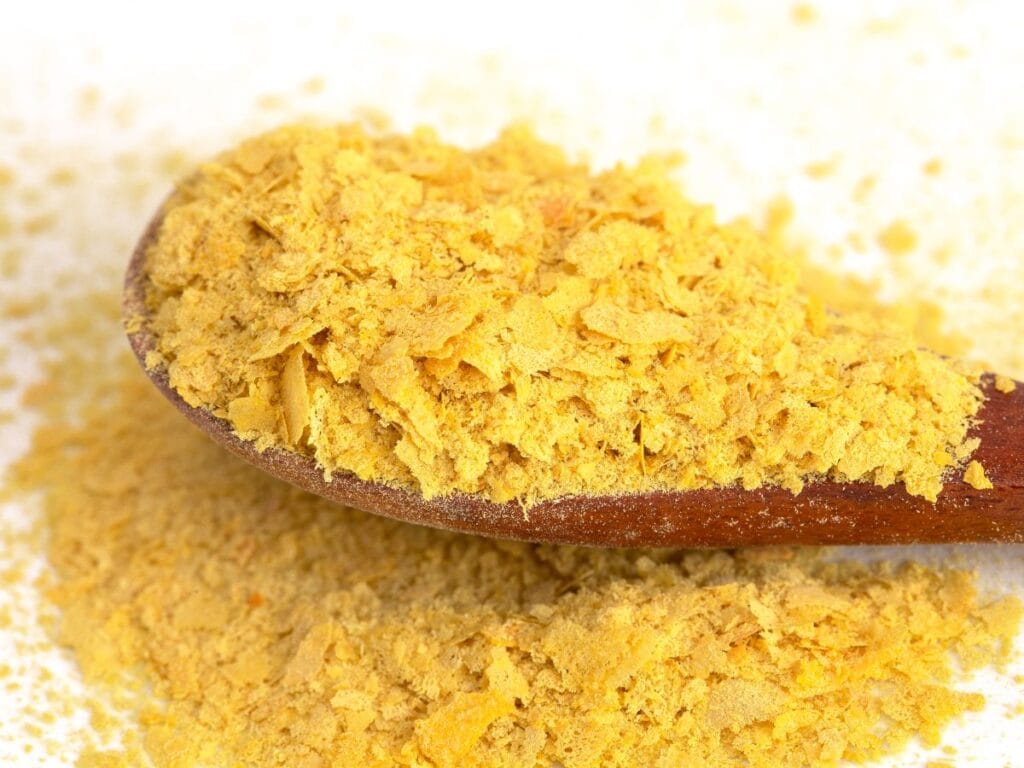
Nutritional yeast is incredibly versatile. It adds amazing cheesy flavor to dishes. This vegan food swap works perfectly as a cheese substitute.
The nutritional benefits are impressive. Two tablespoons deliver 8g protein. They also provide 8–12µg B12. This covers your daily B12 needs completely. Best of all, you get only 60 calories.
However, calcium content is low. It contains just 20mg per serving. Despite this limitation, it’s fantastic for flavor.
Usage tips: Sprinkle it on pasta for instant umami. It also works great on popcorn. For the best quality, try Bragg Nutritional Yeast.
Cashew Cheese: Creamy Dreamy Vegan Food Swap
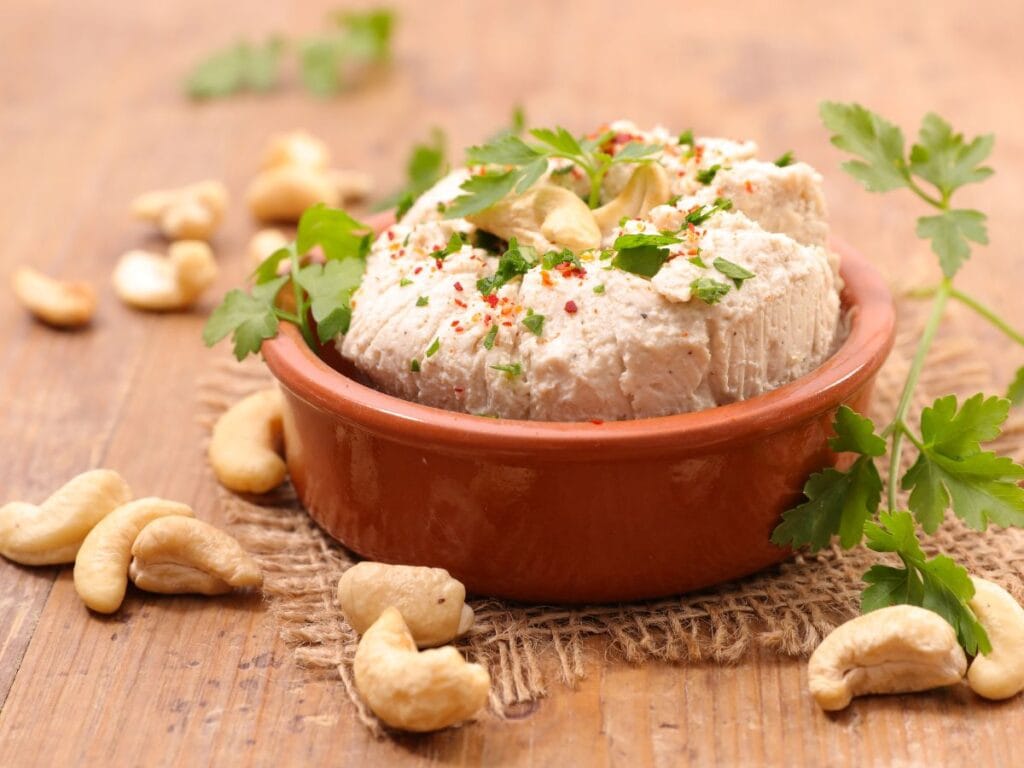
Homemade cashew cheese won my heart completely. Furthermore, it’s perfect for dips and spreads. Here’s the nutritional breakdown of this vegan cheese:
- Calories: A quarter-cup contains 100 calories (12% less than cheddar)
- Fat content: You get 8g fat, mostly unsaturated
- Magnesium boost: Cashew cheese offers 83mg magnesium (twice cheddar’s amount)
- Zero cholesterol: Unlike dairy cheese
However, protein is lower at 5g. Also, calcium is just 10mg unless fortified. Additionally, carbs are higher at 5g in this vegan food swap.
Nutrient Trade-Offs in Plant-Based Cheeses
Nutritional yeast and cashew cheese offer 10–20mg calcium while cheddar provides 200mg calcium. Therefore, choose fortified vegan cheese whenever possible.
Nut-based vegan cheeses increase carbs slightly. Avoid coconut oil-based versions for less saturated fat. Instead, choose nut-based or home made vegan cheeses over store bought cheeses.
Best Vegan Butter Swaps: Creamy, Healthy, Earth-Friendly
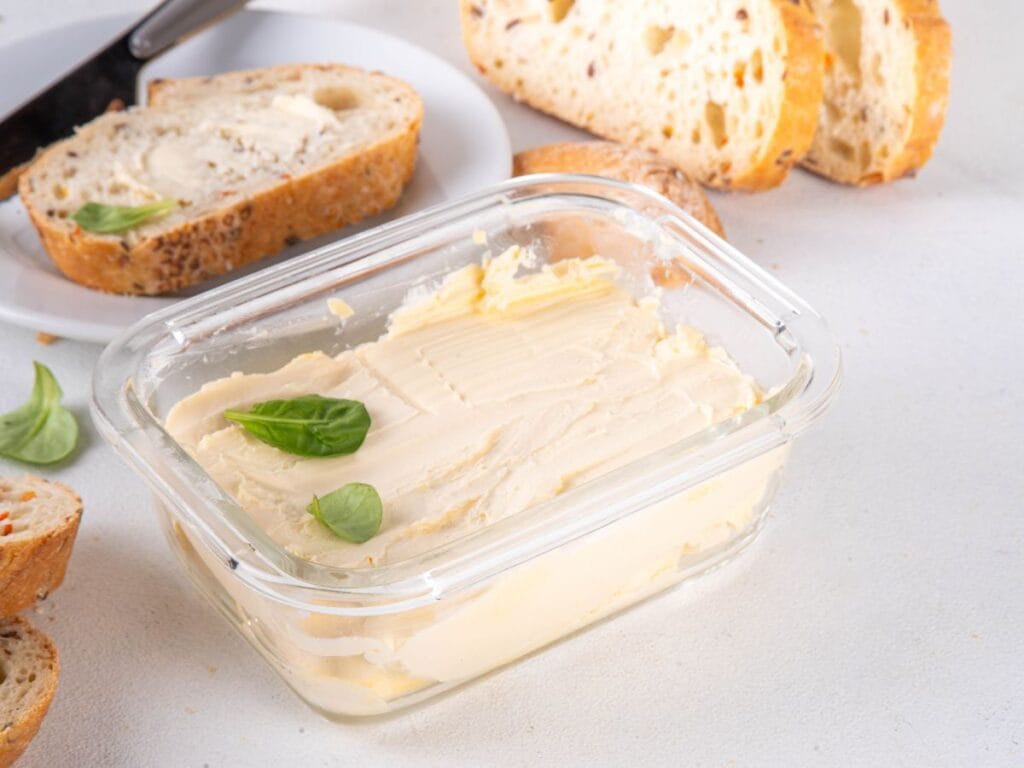
Vegan butter swaps are your secret weapon for sustainable, heart-healthy cooking without losing that spreadable magic. Surprisingly, alternatives like avocado and olive oil often beat butter’s nutrition while slashing environmental impact.
Health Benefits of Vegan Food Swaps for Butter
Swapping out butter isn’t just a win for the planet—it’s a smart move for your health too. Avocados add fiber and potassium, while olive oil offers heart-healthy fats. Most plant-based options are cholesterol-free and some are even fortified with vitamin D, unlike regular butter, which is high in saturated fat.
Top Vegan Butter Swaps
Coconut Oil: Baking’s Best Vegan Food Swap
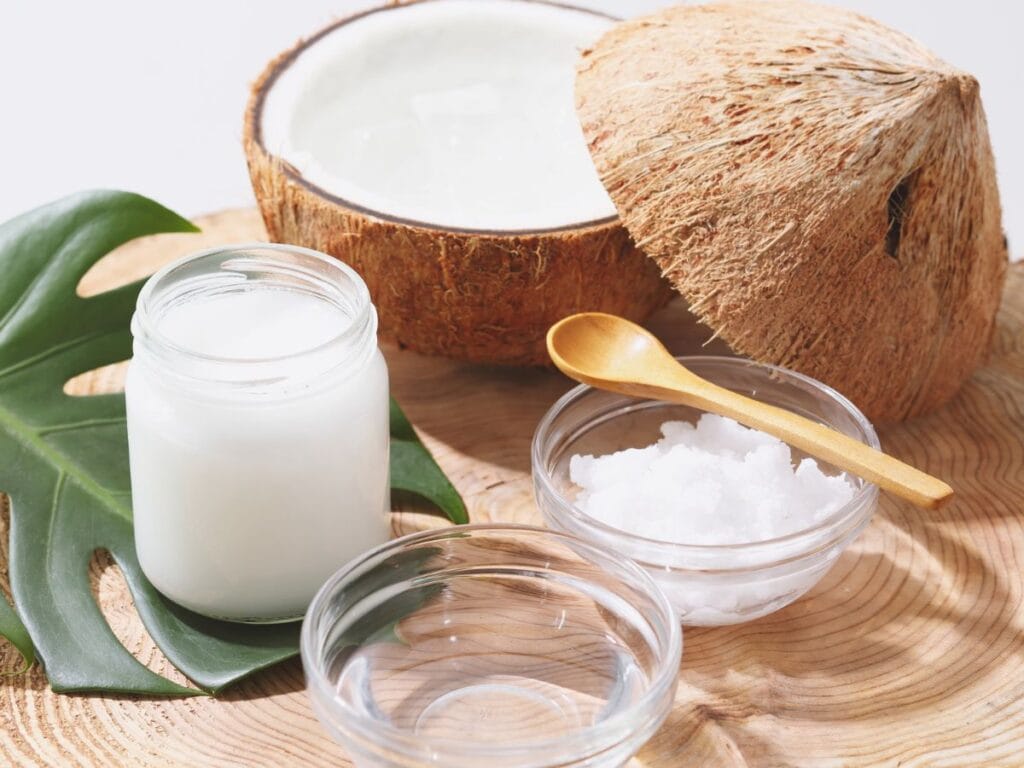
Coconut oil offers melt-in-your-mouth texture. A tablespoon has 117 calories (15% more than butter). Furthermore, it contains 13g fat, including 11g saturated.
It provides 8g MCTs, boosting energy expenditure by 4–5%. Furthermore, lauric acid offers antimicrobial benefits. Therefore, use this vegan food swap for high-heat cooking or flaky pastries.
Olive Oil: Heart-Healthy Vegan Food Swap
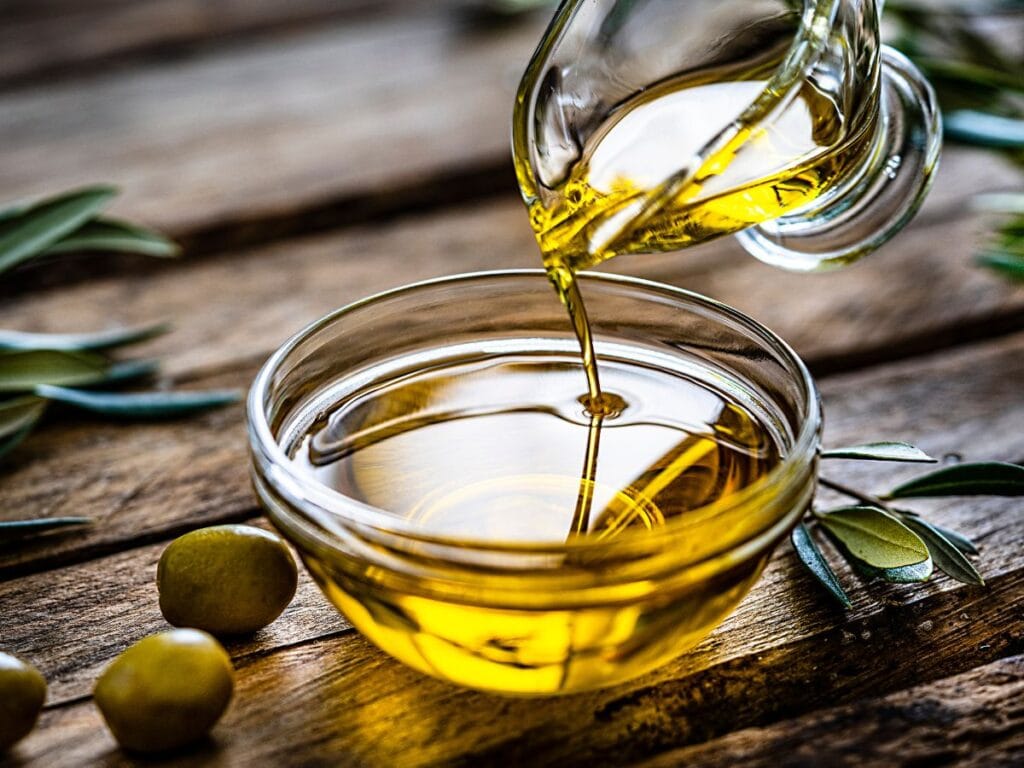
Olive oil’s my go-to sautéing vegan food swap. Moreover, it’s liquid gold for cooking. It contains 119 calories (17% more than butter). Furthermore, it offers 13.5g fat, with 9.9g monounsaturated.
Additionally, it provides 8.4mg vitamin K and 1.9mg vitamin E and polyphenols cut heart disease risk by 15%.
Mashed Avocado: Creamy Spread Vegan Food Swap
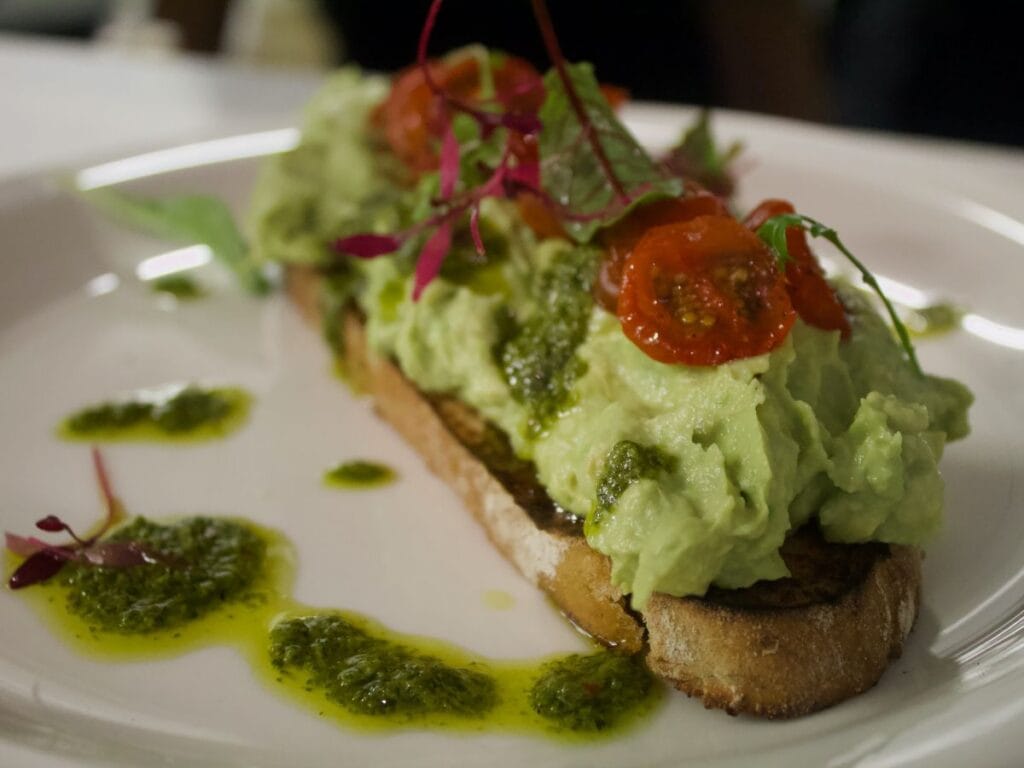
A quarter mashed avocado has only 80 calories (22% less than butter) and contains 7g fat, which is 39% lower than butter.
Moreover, it delivers 1g protein and 6mg calcium plus you get 3g fiber plus 250mg potassium.
Vegan Butter Brands: Spreadable Vegan Food Swaps
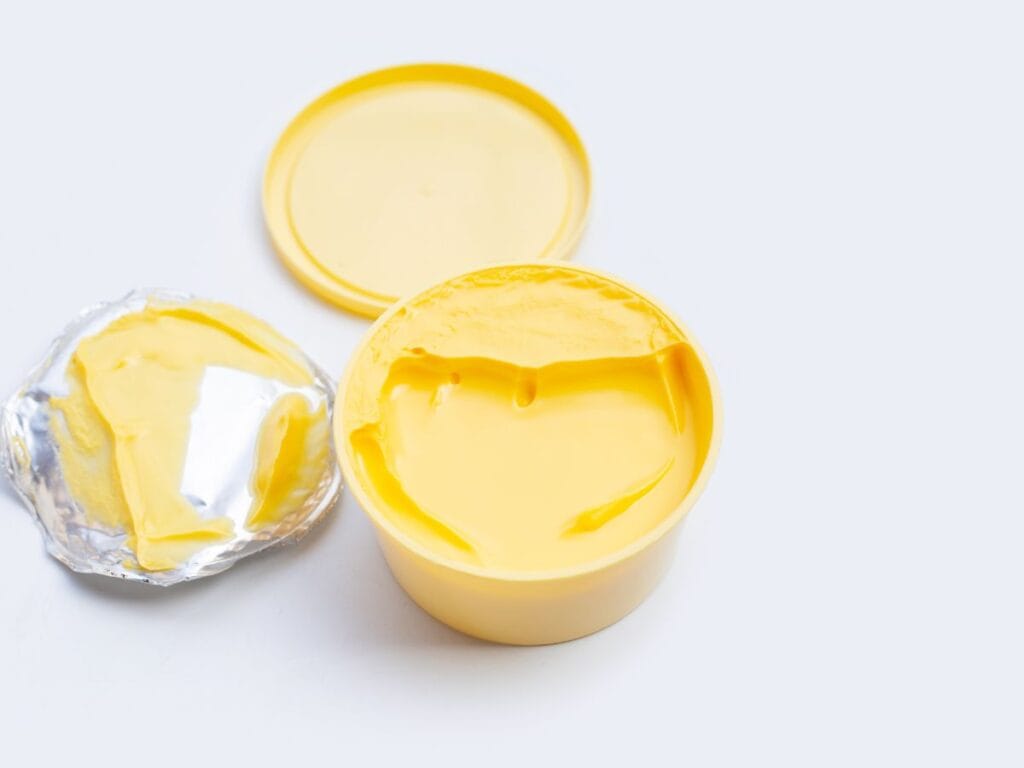
Vegan butter brands range from 80–100 calories. That’s 2–22% less than butter. Furthermore, these vegan food swaps contain 9–11g fat with just 2–3g saturated. Most brands are cholesterol-free and fortified with vitamin D.
Nutrient Trade-Offs in Vegan Butter
Coconut oil has high saturated fat content. However, avocado offers a healthier fat profile but protein and calcium are generally low.
Plant-based oils have more calories than butter. Therefore, choose olive or avocado for healthier fats.
Best Vegan Yogurt Swaps: Creamy, Probiotic, Planet-Friendly
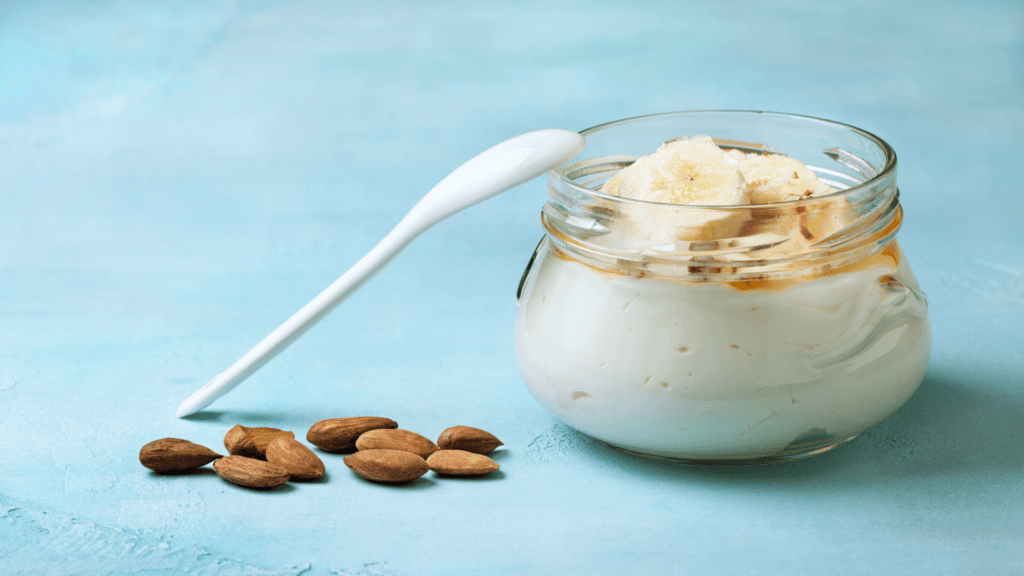
Vegan yogurts are your go-to for sustainable, gut-friendly eating without the sugar overload of dairy. Surprisingly, plant-based yogurts often match or beat dairy’s nutrition while cutting environmental impact. Let’s explore why these alternatives are perfect for your vegan lifestyle.
Health Benefits of Plant-Based Yogurt
Vegan yogurts aren’t just for smoothie bowl enthusiasts. Fortified options, like almond yogurt, hit 200–450mg calcium per 5.3oz, matching or topping dairy’s 200mg. They’re cholesterol-free and often pack probiotics—up to 10 billion CFUs—outshining dairy’s counts [PETA, 2024]. Plus, many add vitamin E and fiber.
Top Vegan Yogurt Swaps
Coconut Milk Yogurt: Tropical Delight
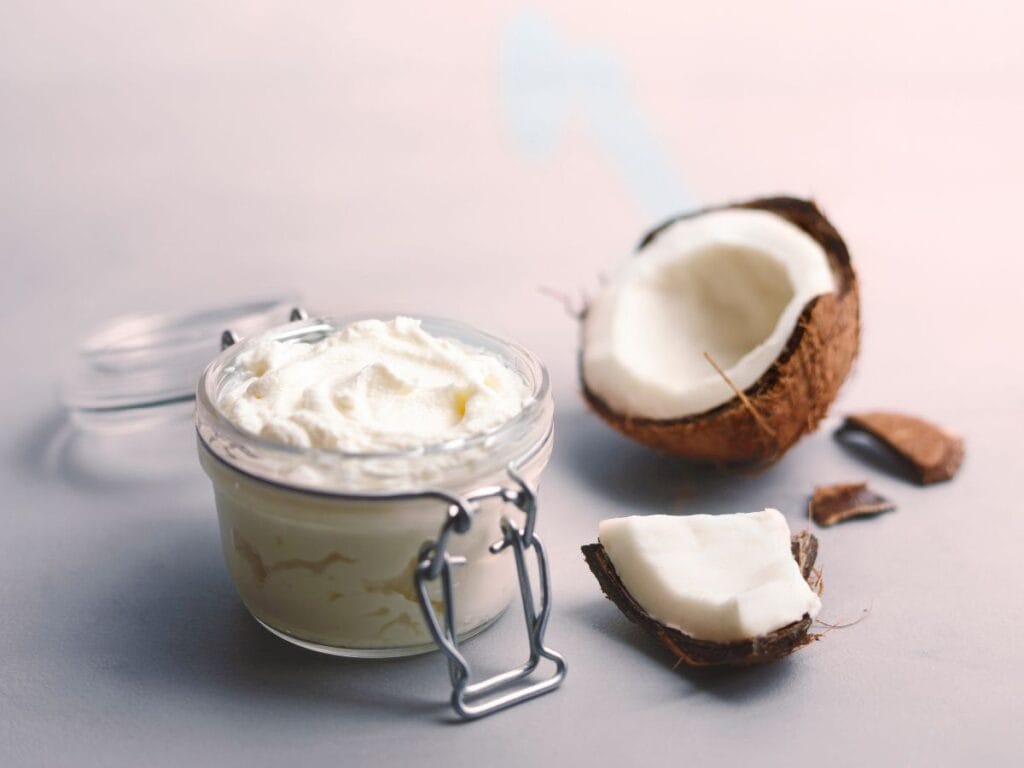
Coconut milk yogurt offers a thick, dreamy texture. A 5.3oz serving has 120–140 calories (7–20% less than dairy). Furthermore, it provides 1–2g fiber, while dairy has none.
Coconut milk yogurt boasts 5–7g MCTs and probiotics and contains zero cholesterol unlike dairy yogurt. The protein content is however low at 1–2g in this vegan food swap. Therefore, use it in tropical dishes or smoothies.
Almond Milk Yogurt: Light and Tangy Vegan Food Swap
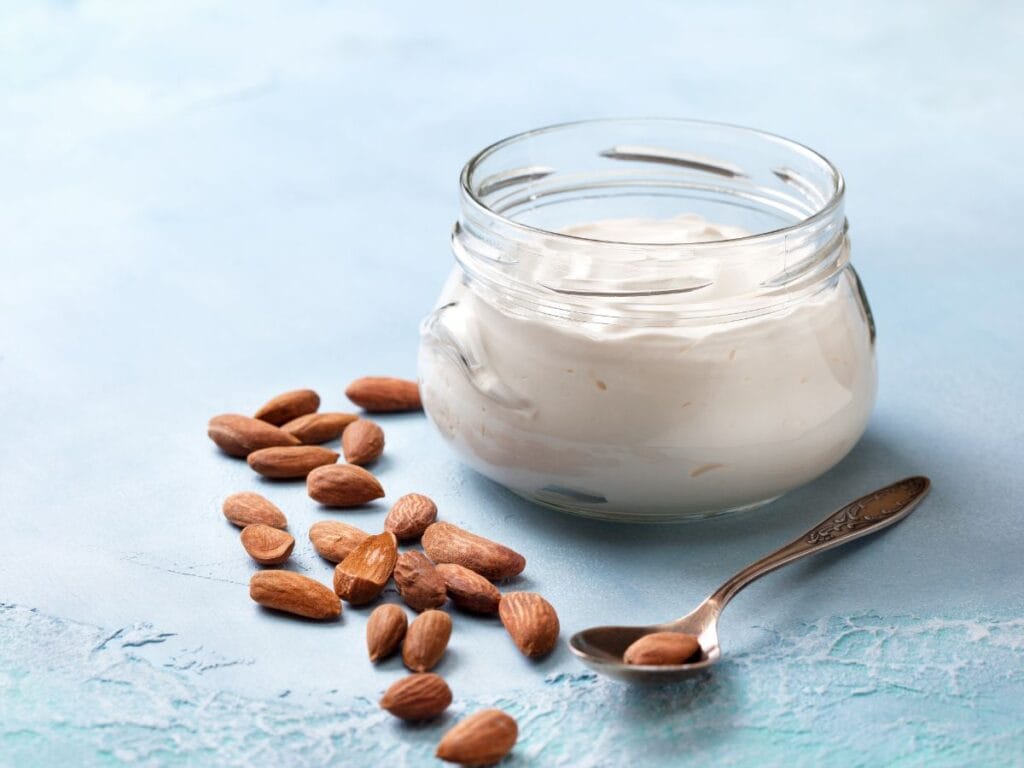
Almond milk yogurt contains 100–130 calories (13–33% less than dairy). Furthermore, fortified versions match dairy’s 200mg calcium.
Almond milk yogurt also provides 5–8mg of vitamin E with 1–2g fiber. Protein ranges from 1–5g unless fortified. Therefore, it’s perfect for healthy snacks.
Soy Milk Yogurt: Protein Powerhouse
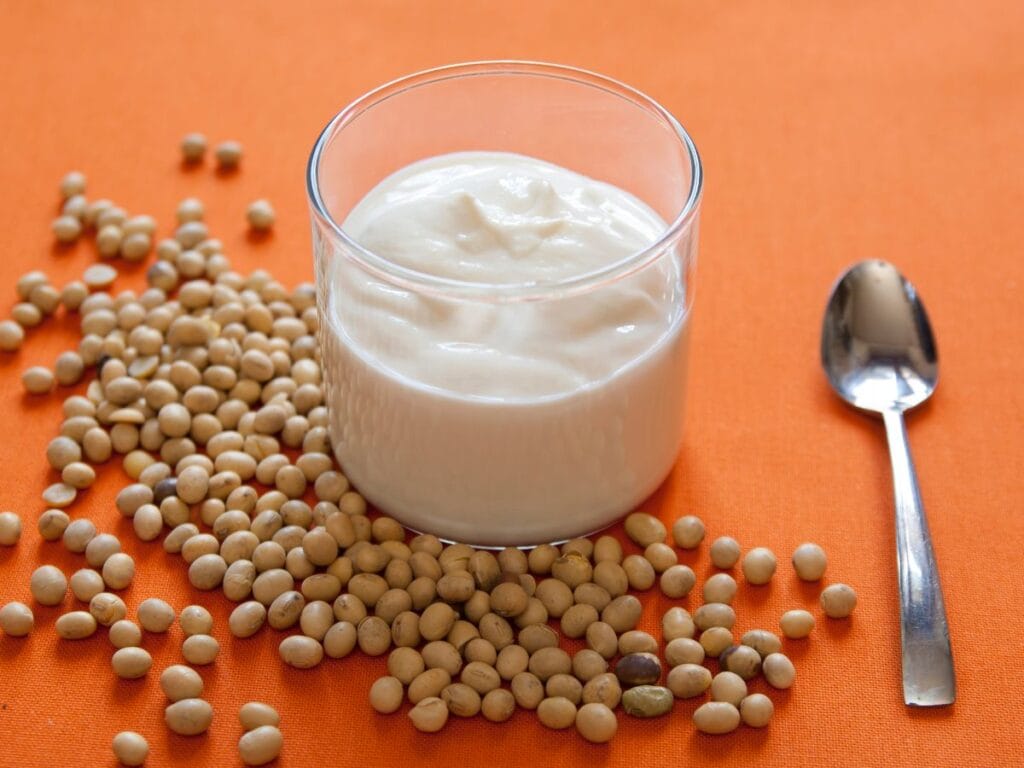
Soy milk yogurt packs 6–8g protein per 5.3oz. That nearly matches dairy’s 5–9g protein content. Furthermore, it’s only 110–140 calories (7–27% less than dairy).
Fortified options hit 200–450mg calcium and offers 25–35mg isoflavones and zero cholesterol. Therefore, use this vegan food swap as a straight recipe replacement.
Nutrient Trade-Offs in Yogurt Vegan Food Swaps
Vegan yogurts generally have less protein than dairy unless you opt for soy yogurt.
The calcium content depends on fortification levels. However, unfortified coconut can drop to 20mg. Therefore, pick an unsweetened option with live probiotics for maximum gut health benefits.
How to Choose the Best Vegan Yogurt Swap
Picking the right yogurt feels like a flavor quest, but it’s doable. Here’s a quick guide:
- Check Fortification: Look for calcium and probiotics on labels.
- Match Your Dish: Desserts? Coconut. Direct swap? Soy.
- Taste Test: Sample brands—So Delicious is rich, Silk is smooth.
- Eco-Check: Soy and almond are greener than coconut [Green et al., 2023].
Best Vegan Egg Swaps: Tasty, Healthy, Planet-Saving
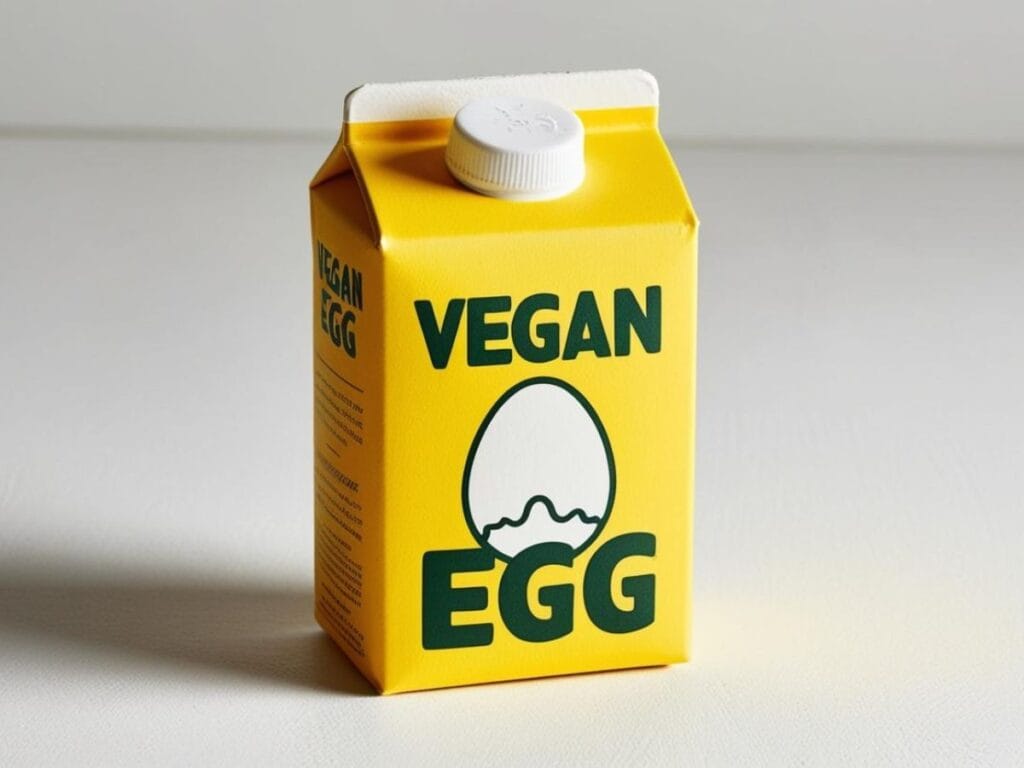
Vegan egg replacements are perfect for sustainable baking. Furthermore, they offer cholesterol-free breakfast alternatives. Surprisingly, alternatives like chia seeds often outshine eggs’ nutrition. Additionally, these vegan food swaps cut environmental impact effectively.
Top Vegan Egg Swaps for Baking
Flaxseed Meal: Muffin Magic
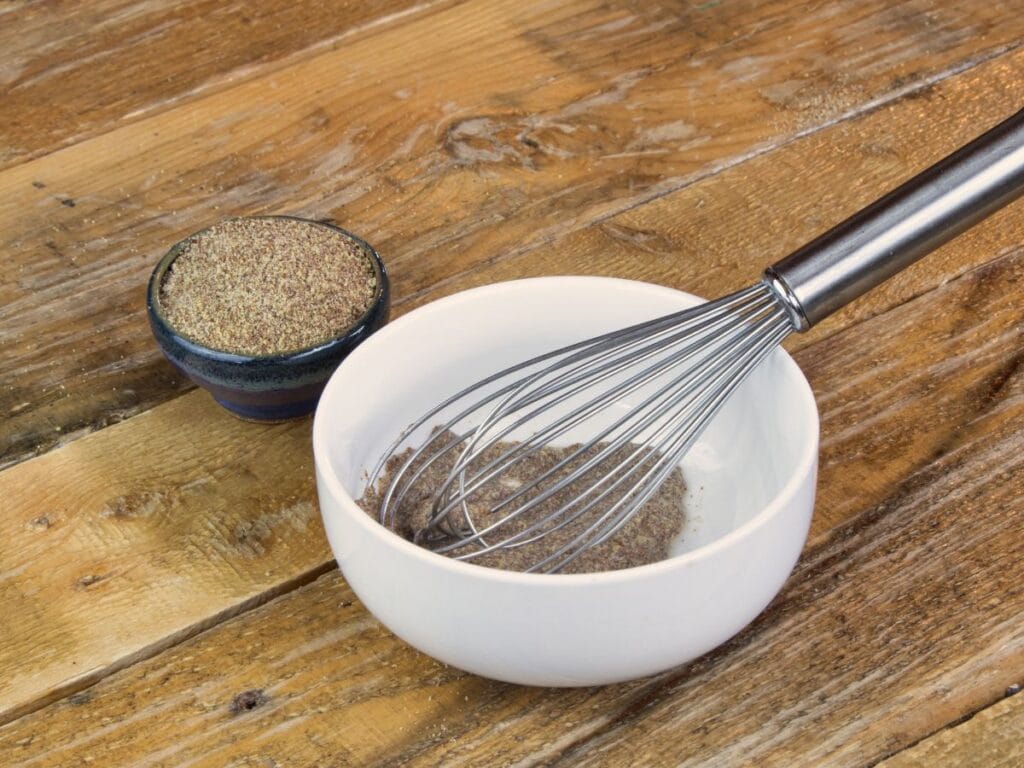
Flaxseed meal offers nutty binding power. One tablespoon mixed with water has 37 calories (49% less than eggs). Furthermore, it provides 3g fat, which is also 40% lower than eggs.
It packs 2.8g fiber and 1,800mg omega-3s. Meanwhile, eggs offer only 70mg omega-3s. Therefore, use this vegan food swap in cookies, breads, muffins and cakes.
Chia Seeds: Pudding Perfection
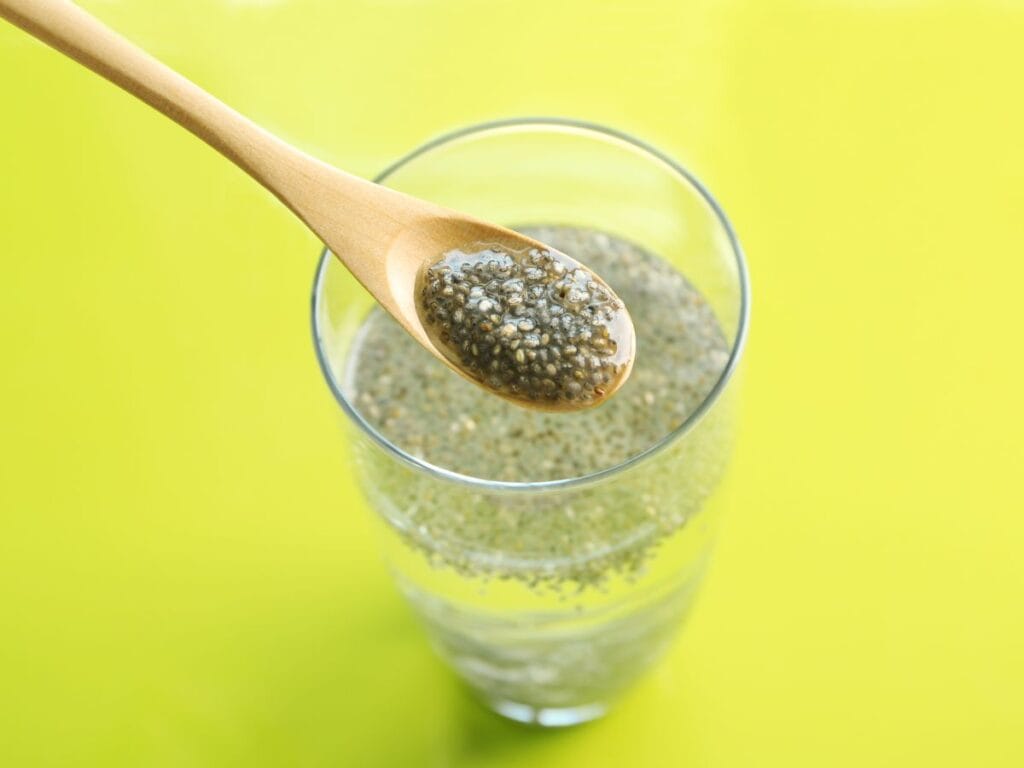
One tablespoon delivers 60 calories (17% less than eggs). Furthermore, it provides 5g fiber and 77mg calcium.
Additionally, it contains 2,500mg omega-3s and 0.9mg iron. Meanwhile, protein content is 2g in this vegan food swap. Therefore, it’s ideal for moist bakes and healthy desserts.
Mashed Banana: Sweet Cake Vegan Food Swap
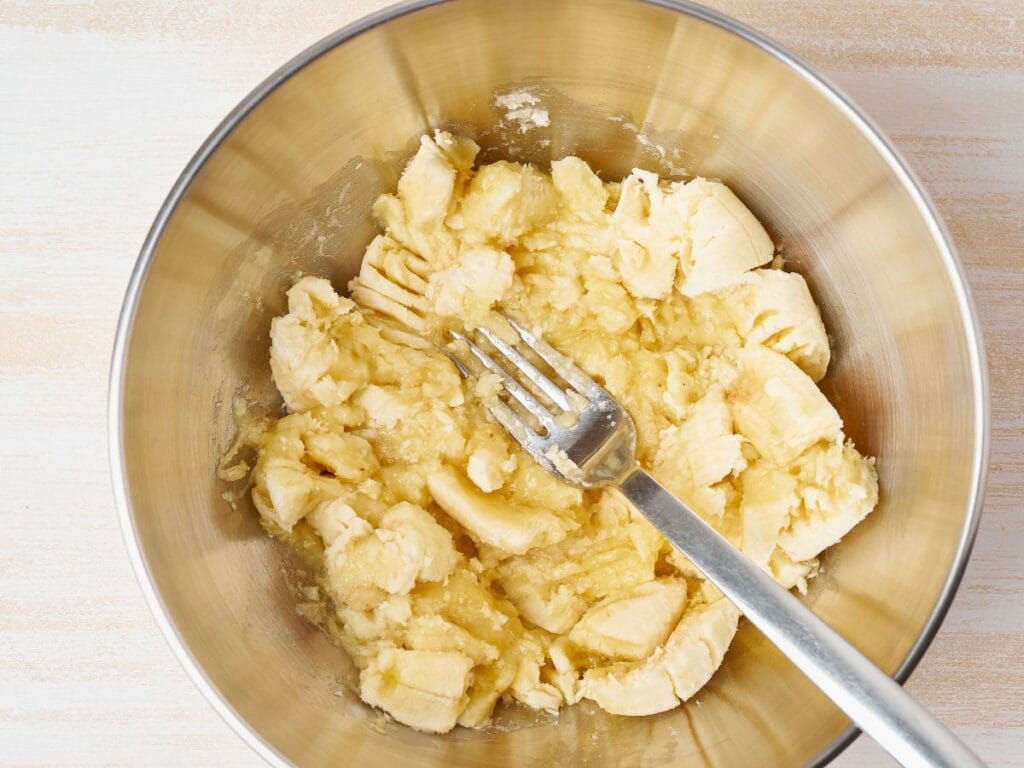
Mashed banana has 53 calories (26% less than eggs). Furthermore, it provides 0.2g fat, which is 96% lower than eggs.
Additionally, it offers 1.5g fiber, 210mg potassium, and vitamin C. Meanwhile, protein’s 0.6g and carbs hit 13g. Therefore, this vegan food swap is perfect for banana bread and muffins.
More Baking Swaps and Scrambles
Baking’s just the start—vegan egg swaps shine in breakfast too. Here’s more, compared to one egg or three eggs (216 calories, 18g protein, 84mg calcium).
Unsweetened Applesauce: Light and Fluffy
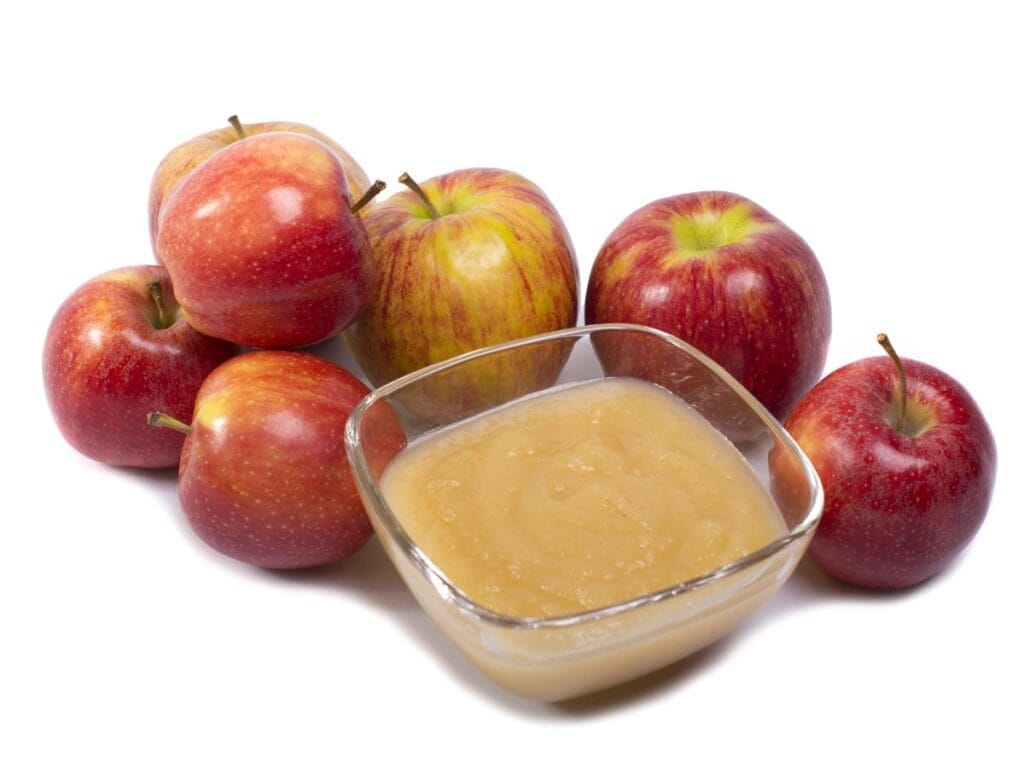
Applesauce keeps my muffins feather-light. A quarter-cup (egg equivalent) has 25 calories, 65% less than an egg, and 0.1g fat—98% lower. It brings 1.5g fiber, 2mg vitamin C, and pectin for gut health [Lee, 2023]. Protein’s 0.2g, calcium’s 3mg, and carbs are 6g, higher than eggs. Use it in cakes. Any unsweetened applesauce works.
Silken Tofu: Creamy Dream
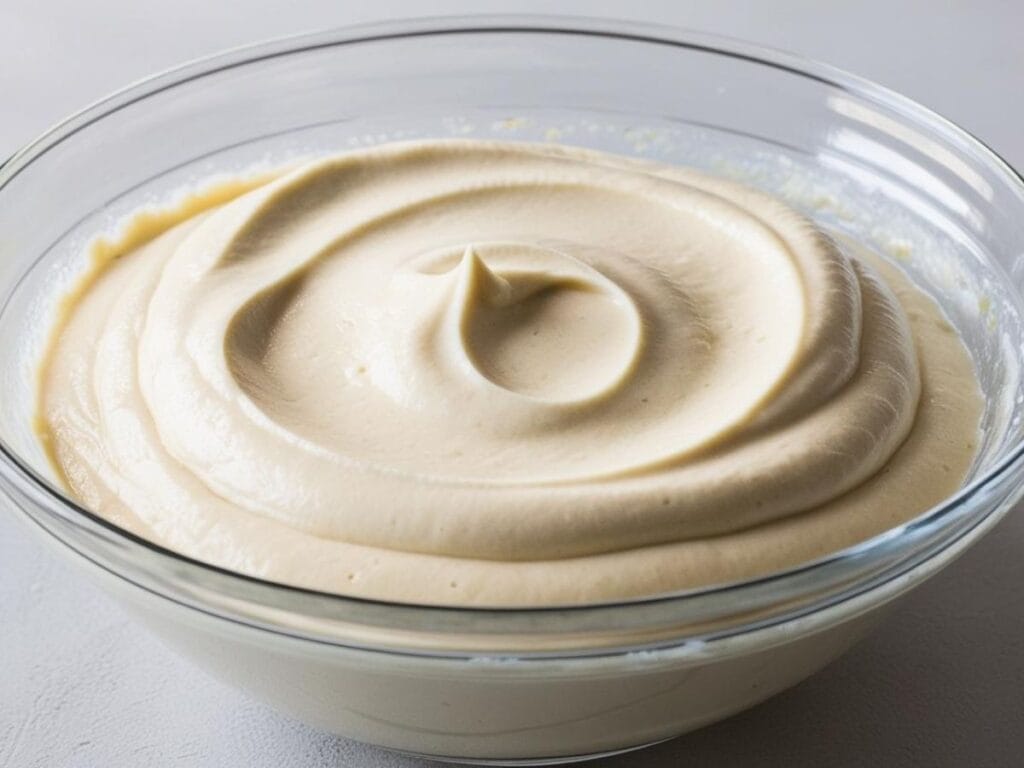
Silken tofu has 35 calories, 51% less than eggs, and 2g fat—60% lower. Calcium ranges from 10–120mg, up to 328% higher if calcium-set, with 4g protein and 1mg iron [NutritionFacts.org, 2023]. Carbs are 1g, slightly higher. Blend it for cheesecakes. Try Mori-Nu Silken Tofu (affiliate link).
Nutrient Trade-Offs to Watch
Most vegan egg replacements offer 0.2–4g protein, less than eggs’ 6g. Scrambled tofu provides 12g. Calcium varies. Chia and tofu excel. Banana and applesauce lag. Banana has 13g carbs. Flax and chia add omega-3s for heart health. Pair tofu with flax for balance.
How to Choose the Best Vegan Egg Swap
Picking the right swap feels like a kitchen experiment, but it’s fun. Here’s a quick guide:
- Check Nutrients: Need calcium? Go chia or tofu. Want omega-3s? Try flax.
- Match Your Dish: Baking? Applesauce or banana. Scrambles? Tofu.
- Taste Test: Banana’s sweet, tofu’s neutral—sample them.
- Eco-Check: Flax and chia are greener than bananas [Green et al., 2023].
Revolutionary Vegan Food Swaps: Scrambled Egg Alternatives That Will Transform Your Breakfast.
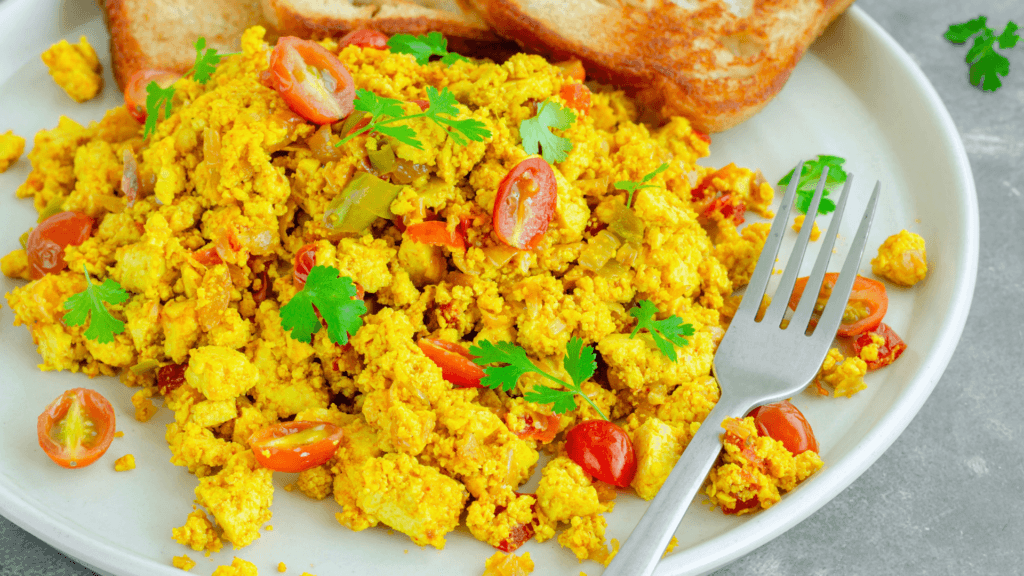
Scrambled Tofu: The Nutritional Powerhouse Vegan Food Swap
Scrambled tofu is a great vegan food swap for eggs. With turmeric and black salt, it tastes surprisingly close to the real thing. It’s also packed with nutrients—600mg of calcium per half cup (compared to 84mg in eggs), 12g of protein, and no cholesterol.
Pro Tip: Press your tofu to remove extra moisture, then crumble it by hand for the best texture. Add a splash of unsweetened plant milk while cooking to make it soft and fluffy.
Chickpea Flour Scramble: The Fiber-Rich Vegan Food Swap
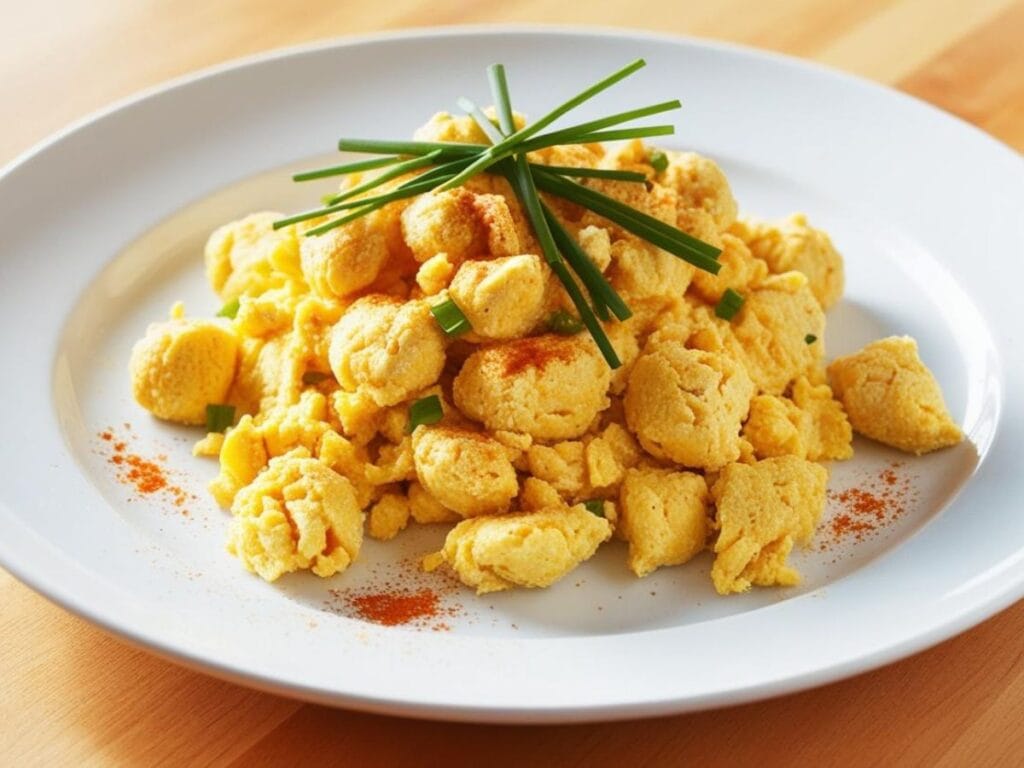
Less known but just as tasty, chickpea flour scramble is another great vegan food swap for eggs. It’s rich in fiber (6g per serving), has no cholesterol, and offers a good amount of protein and folate.
Pro Tip: Mix chickpea flour with water (2:1 ratio), black salt, and a spoon of nutritional yeast. Let it rest for 10 minutes before cooking for the best texture and flavor.
Try adding veggies like spinach, peppers, or mushrooms, and season with turmeric or garlic powder to level up your scramble.
Meat-Free Magic: Game-Changing Vegan Food Swaps That Satisfy Every Craving
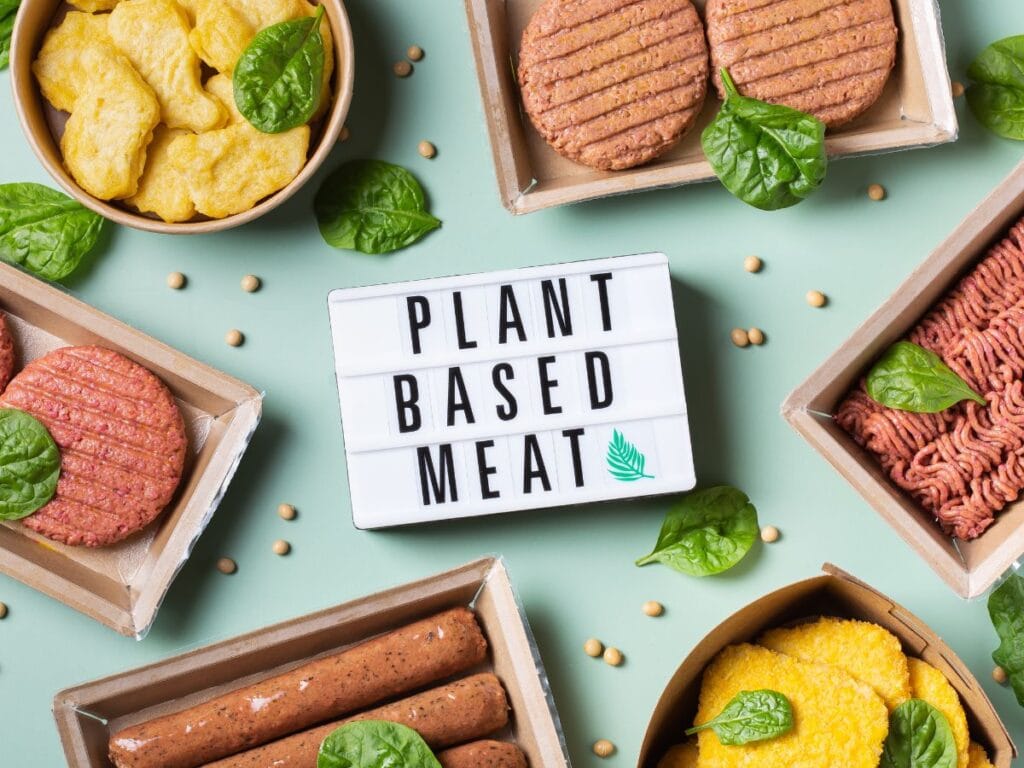
Eating less meat doesn’t mean missing out. With the right vegan food swaps, you can enjoy familiar textures and bold flavors—plus the added benefits of plant-based nutrition. These simple changes make your meals both satisfying and better for your health.
Beef Alternatives: Plant-Based Protein Powerhouses
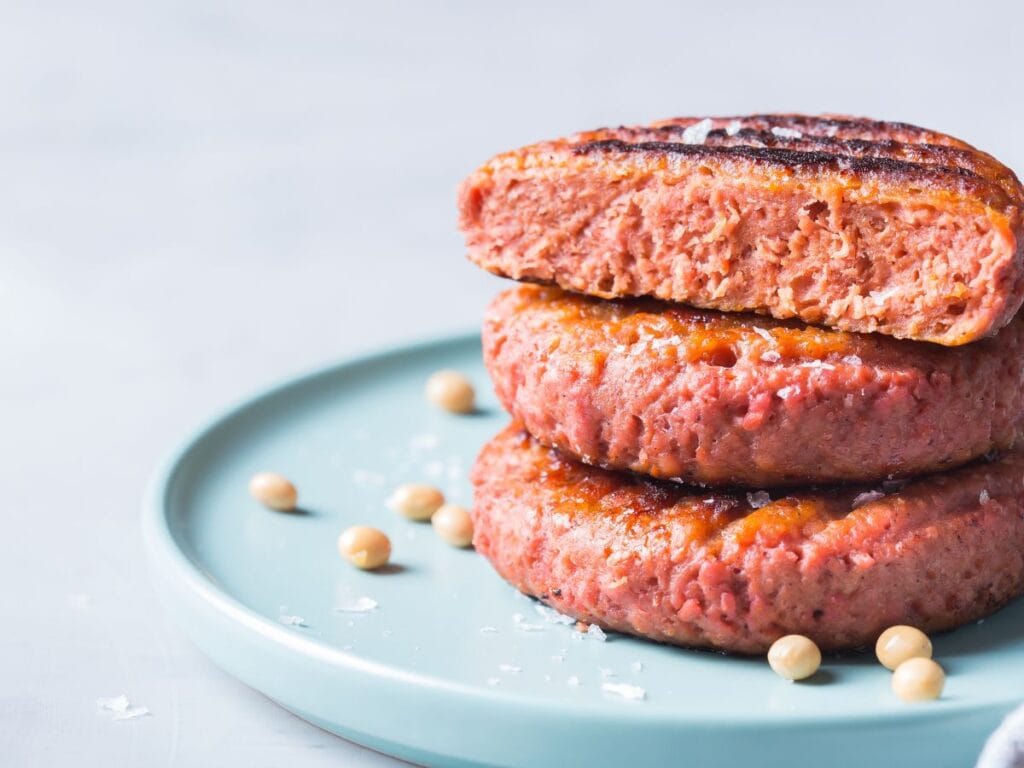
Traditional ground beef packs about 250 calories, 20g protein, and 20mg calcium per 100g—along with saturated fat and cholesterol your body doesn’t need. These vegan food swaps offer impressive nutritional profiles without the downsides:
1. Lentil Magic: The Fiber-Rich Beef Replacement
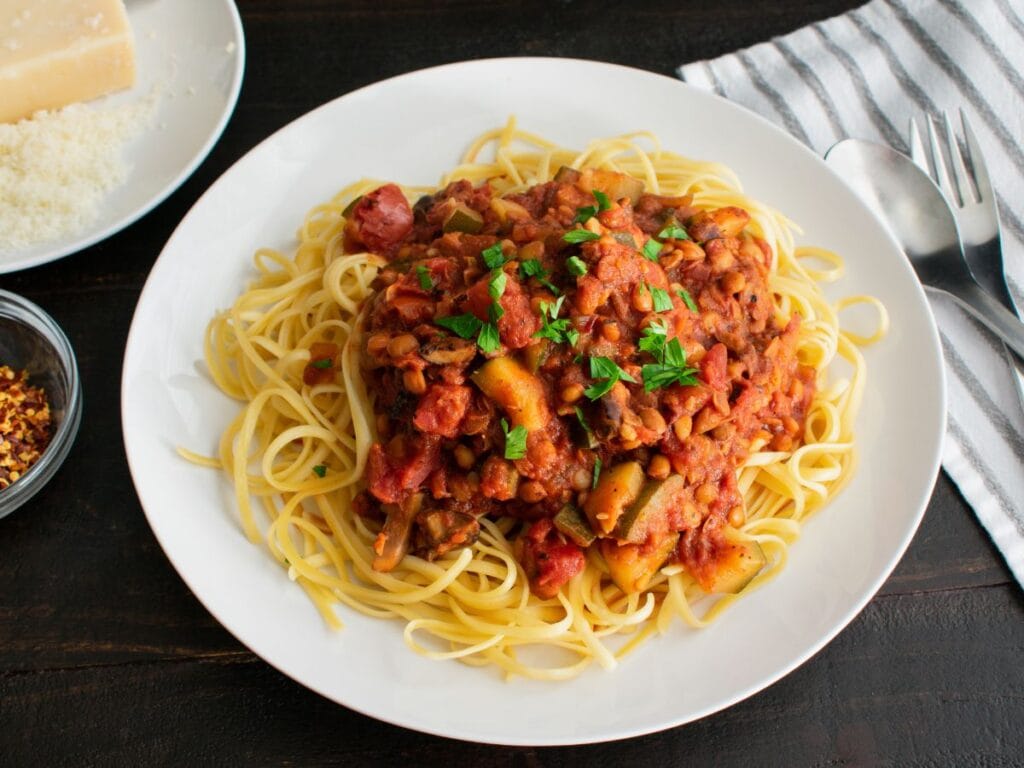
Lentils are amazing for transformation. They work perfectly in taco nights. They also enhance hearty Bolognese sauces. Their meaty texture is impressive. Plus, their nutritional profile is outstanding.
Here’s why nutritionists love this swap:
Fiber superstar: Lentils contain 16g fiber per cup. Meanwhile, beef has zero grams. This supports gut health. It also provides sustained energy.
Heart-healthy choice: Lentils contain just 1g fat per cup. In contrast, beef has 10g fat. That’s a 90% reduction in fat content.
Iron powerhouse: Lentils deliver three times more iron than beef. Specifically, that’s 3mg versus 1mg per serving.
Bonus nutrition: Lentils are rich in folate. This nutrient is essential for cell reproduction. Importantly, beef completely lacks folate.
2. Crumbled Tofu: The Protein Chameleon
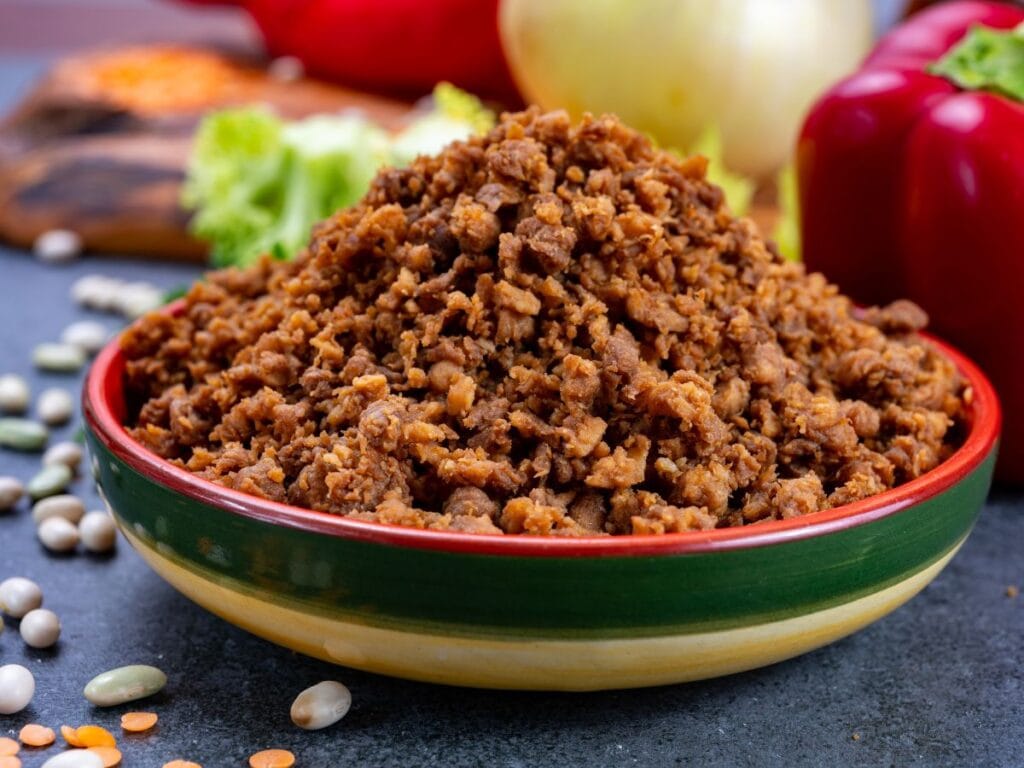
This versatile soy product takes on flavors beautifully in burgers and crumbles, making it one of the most adaptable vegan food swaps.
The nutritional edge:
- Calcium champion: Provides ~200mg per ½ cup versus beef’s ~20mg—crucial for bone health
- Zero cholesterol: Contains 0mg cholesterol compared to beef’s 80mg
- Complete protein: Contains all nine essential amino acids for optimal muscle maintenance
- Isoflavone benefits: Offers protective phytonutrients linked to reduced cancer risk
Chef’s secret: Press firm tofu thoroughly before crumbling to achieve the perfect meaty texture. Freezing tofu first creates even meatier results as the water crystals create pockets that absorb marinades better.
3. Magnificent Mushrooms: Umami Flavor Masters
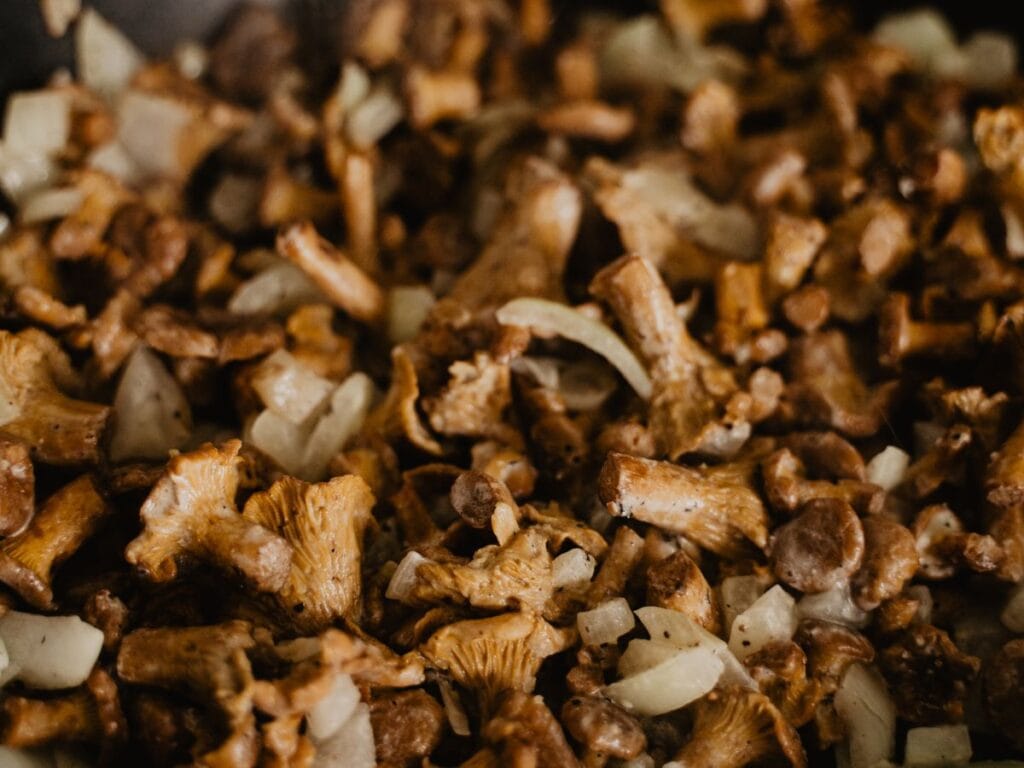
Portobello, cremini, and shiitake mushrooms deliver rich, savory flavors perfect for shepherd’s pie and stroganoff dishes.
Why mushrooms matter:
- Calorie miracle: Just ~30 calories per cup versus beef’s ~250 (88% fewer calories)
- Immune support: Contains beta-glucans that research shows may enhance immune function
- Vitamin D boost: One of the few natural plant sources of vitamin D when exposed to sunlight
- Sustainable choice: Require significantly less water and land than beef production
Culinary insight: Roast mushrooms before incorporating them into recipes to concentrate their meaty flavor and remove excess moisture for the perfect texture.
4. TVP (Textured Vegetable Protein): The Meatball Master
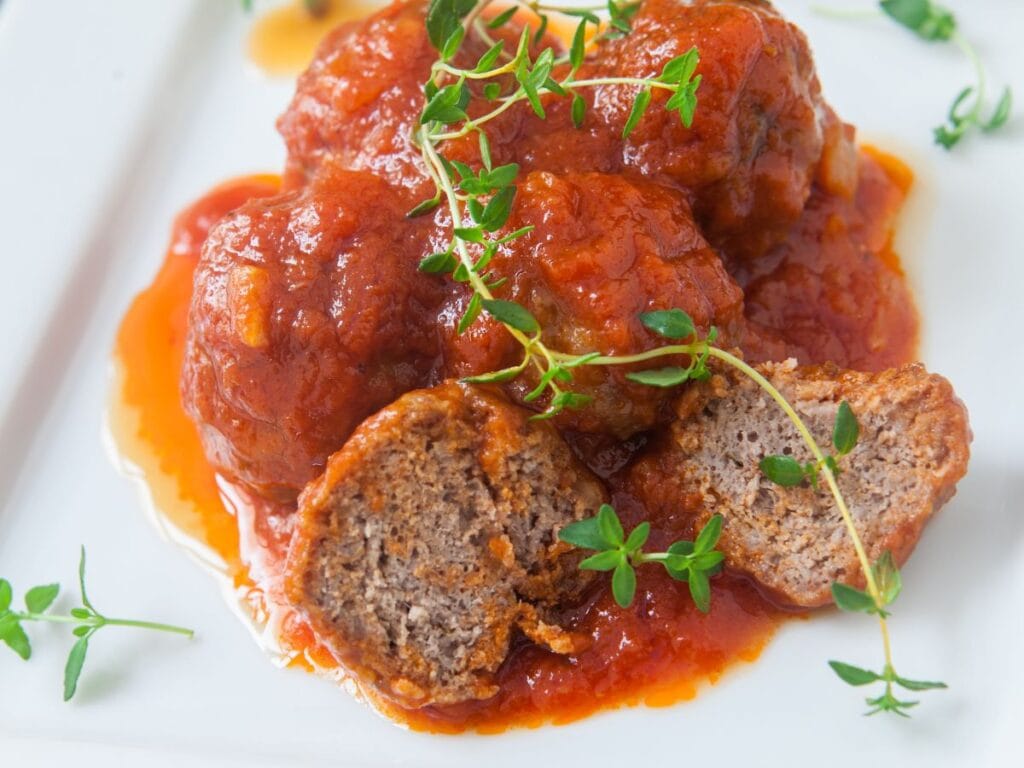
This dehydrated soy product rehydrates into a remarkably meat-like texture that’s perfect for meatballs and hearty stews.
Nutritional highlights:
- Fiber boost: 4g per ¼ cup dry versus 0g in beef
- Fat reduction: Just ~1g per ¼ cup dry versus beef’s 10g (80% lower)
- Protein packed: 12g protein per ¼ cup dry—comparable to beef’s protein content
- Shelf-stable convenience: Keeps for months in your pantry for quick meals
Health expert tip: While highly processed, TVP offers excellent nutrition when paired with whole foods like vegetables and whole grains. A 2023 study in the Journal of Nutrition found that balanced plant-based diets incorporating some processed proteins still showed significant health advantages over meat-based diets.
Chicken Alternatives: Versatile Vegan Protein Sources
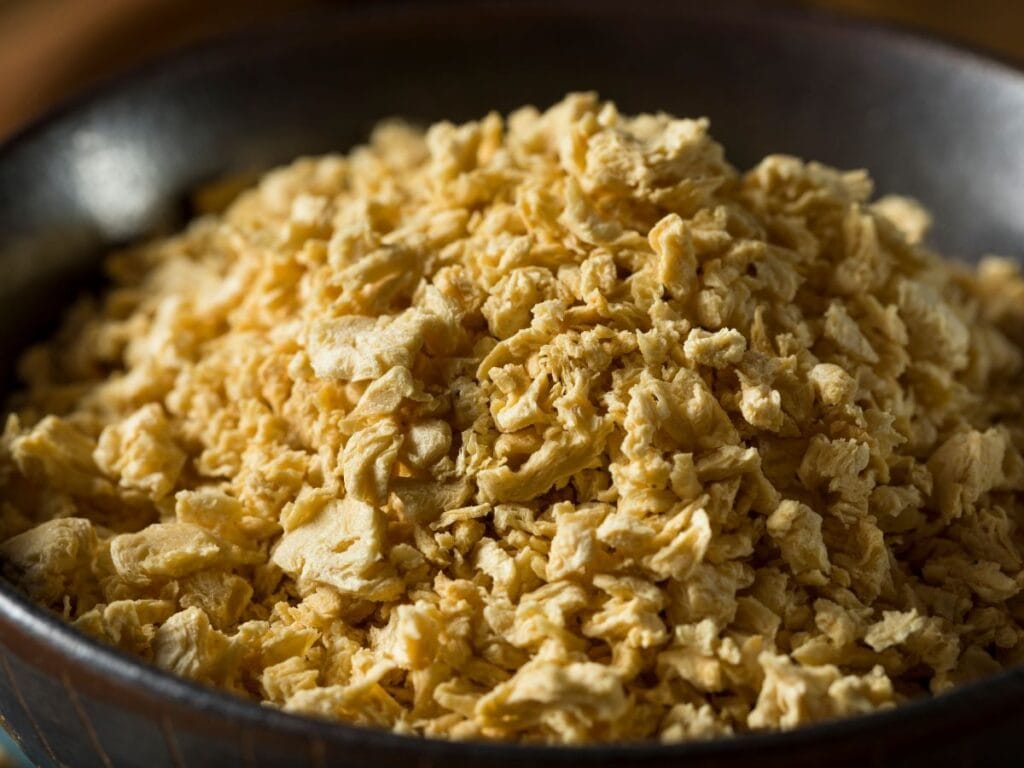
Chicken provides 165 calories, 20g protein, and 15mg calcium per 100g, but comes with cholesterol concerns. These vegan food swaps offer fantastic alternatives:
1. Chickpea Champions: Versatility Virtuosos
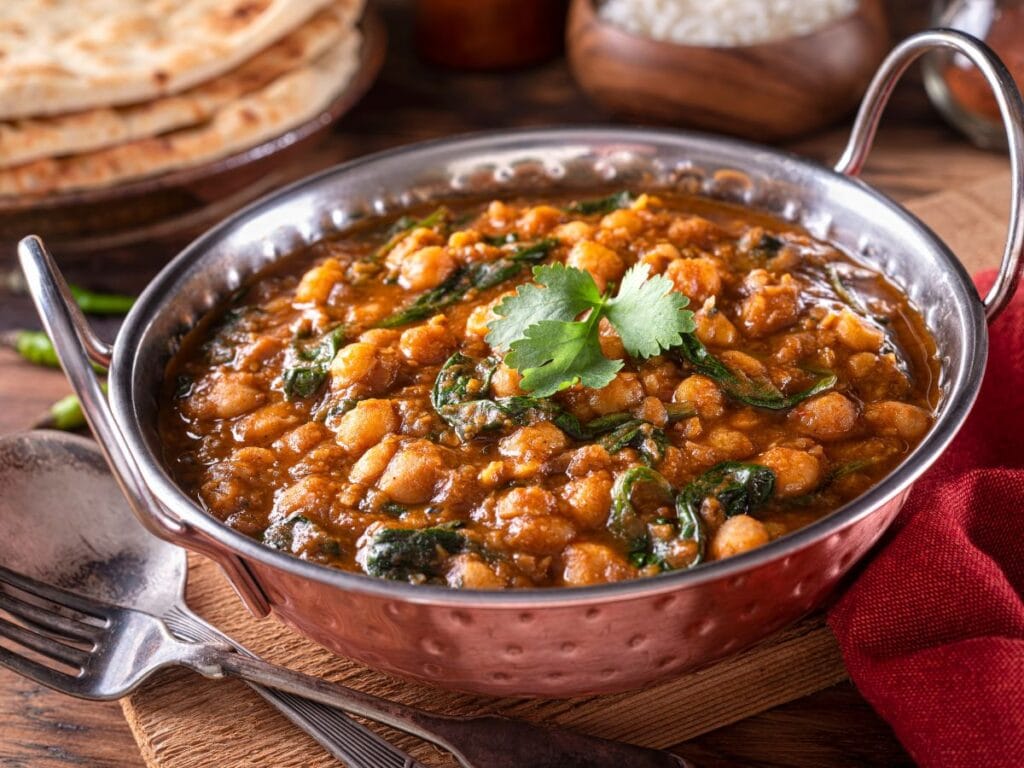
These legumes shine in curries, salads, and even “chicken” salad sandwiches with impressive nutritional benefits.
The chickpea advantage:
- Fiber foundation: 15g per cup versus chicken’s 0g—supporting digestive health
- Iron increment: 25% more iron than chicken (~2mg vs. 1.6mg)
- Folate fortification: Provides essential B vitamins absent in chicken
- Heart health helper: Zero cholesterol compared to chicken’s significant content
Creative cooking hack: Mash chickpeas with vegan mayo, celery, and poultry seasoning for a convincing “chicken” salad that even omnivores will enjoy.
2. Sensational Seitan: The Wheat Meat Wonder
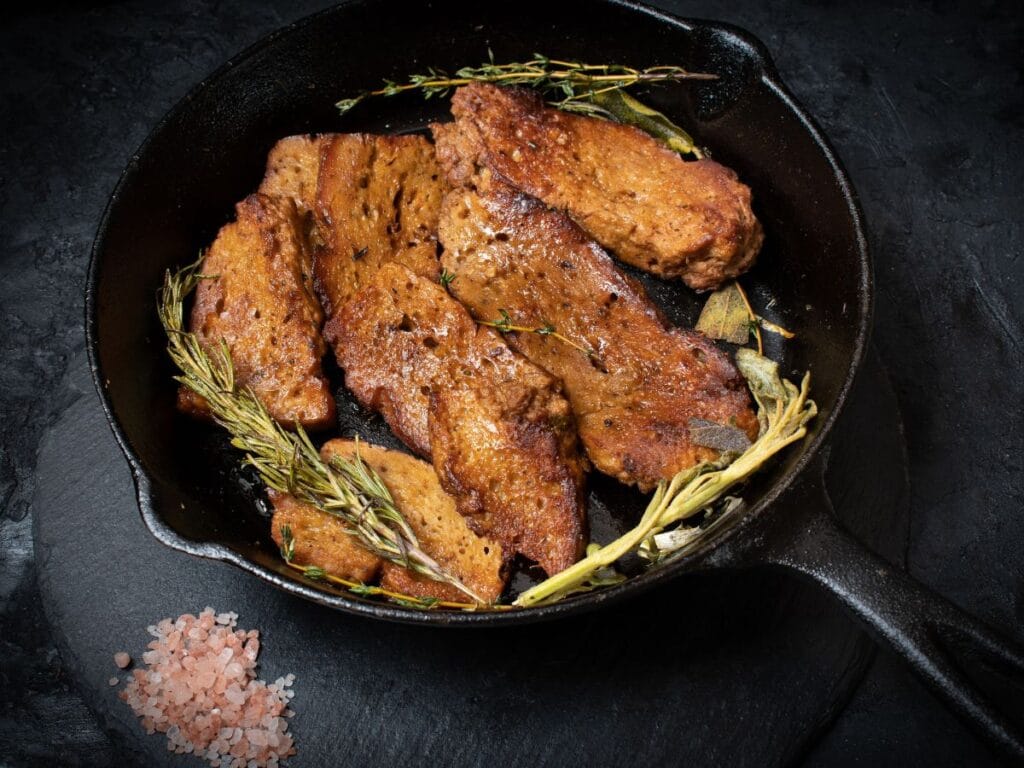
Made from vital wheat gluten, seitan delivers an unmatched chewy texture perfect for stir-fries and grilled dishes.
Seitan stands out with:
- Protein powerhouse: 25g per 3.5oz versus chicken’s ~23g (10% higher)
- Iron improvement: More iron than chicken (~2mg vs. 1.6mg)
- Fat reduction: Just ~1g per 3.5oz versus chicken’s 3.6g (72% lower)
- Zero cholesterol: Contains none of chicken’s artery-clogging cholesterol
Chef’s note: Seitan absorbs marinades beautifully. For the most chicken-like results, simmer it in vegetable broth with poultry seasoning before using in recipes.
3. Spectacular Soy Curls: Texture Transformers
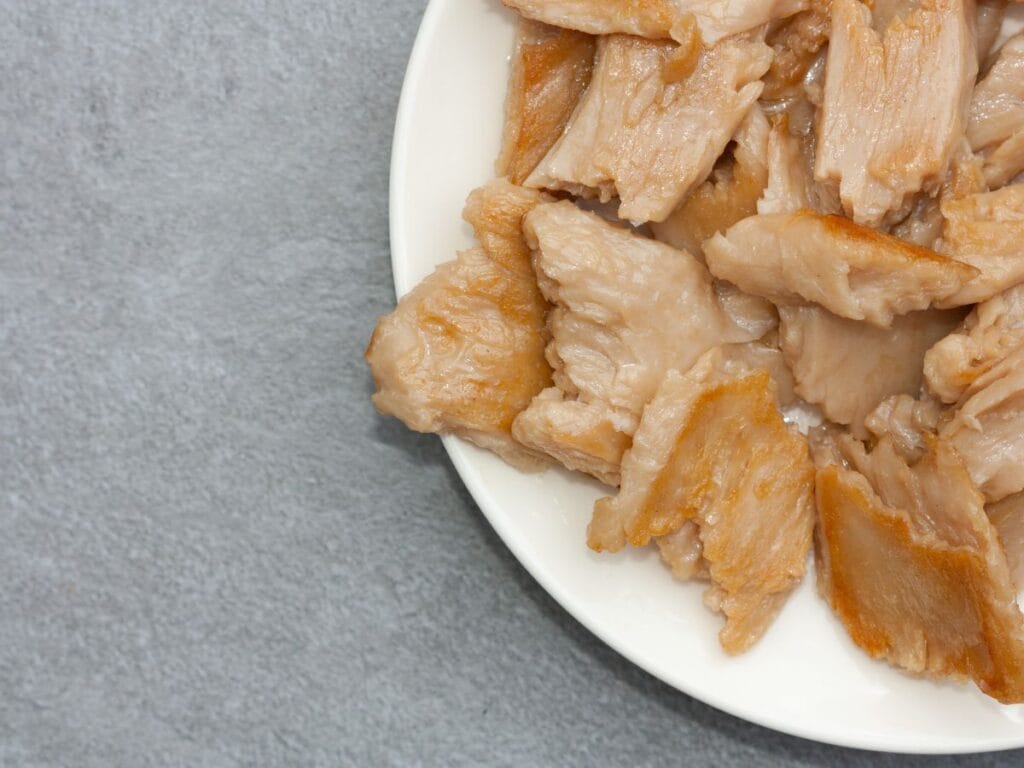
These minimally processed whole soybean products rehydrate into remarkably chicken-like strips.
Why nutritionists recommend them:
- Fiber inclusion: 6g per serving versus chicken’s 0g
- Complete amino profile: Contains all essential amino acids for optimal nutrition
- Calcium consideration: ~100mg per serving versus chicken’s ~15mg
- Clean ingredient list: Made from whole soybeans without additives or preservatives
Preparation perfection: Rehydrate soy curls in savory broth rather than plain water to infuse maximum flavor before cooking.
Bacon Alternatives: Smoky, Savory Satisfaction
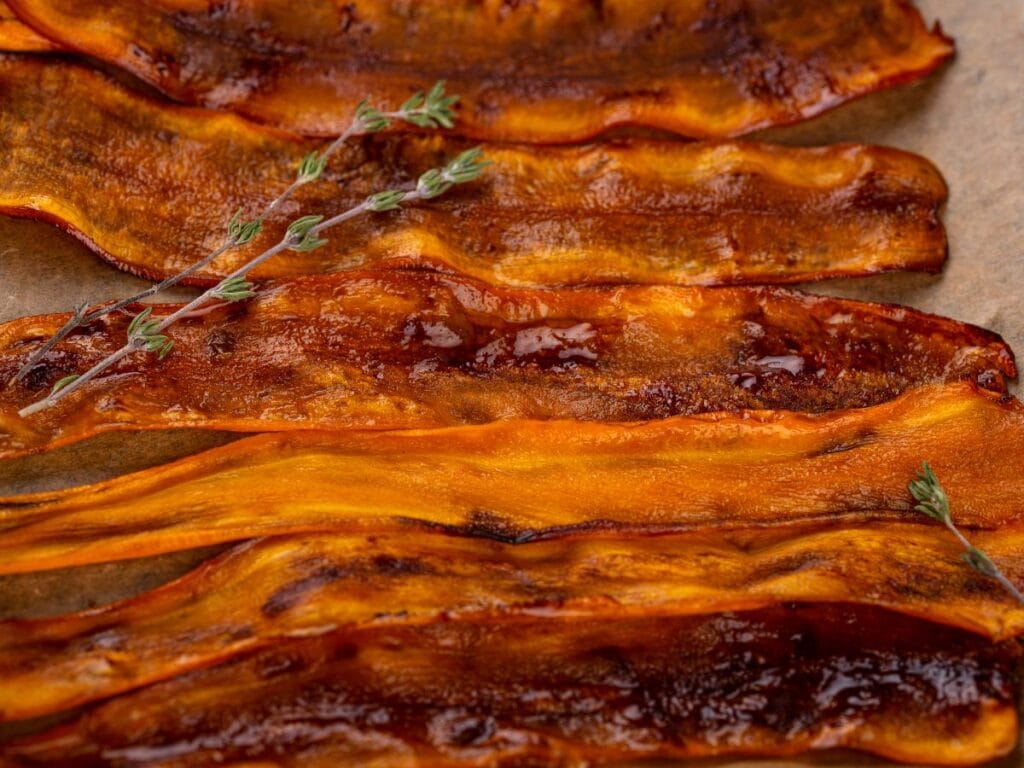
Traditional pork bacon delivers 540 calories, 37g protein, and 10mg calcium per 100g, but with considerable fat and sodium. These vegan food swaps satisfy bacon cravings without the health concerns:
1. Tempting Tempeh Bacon: Probiotic-Rich Protein
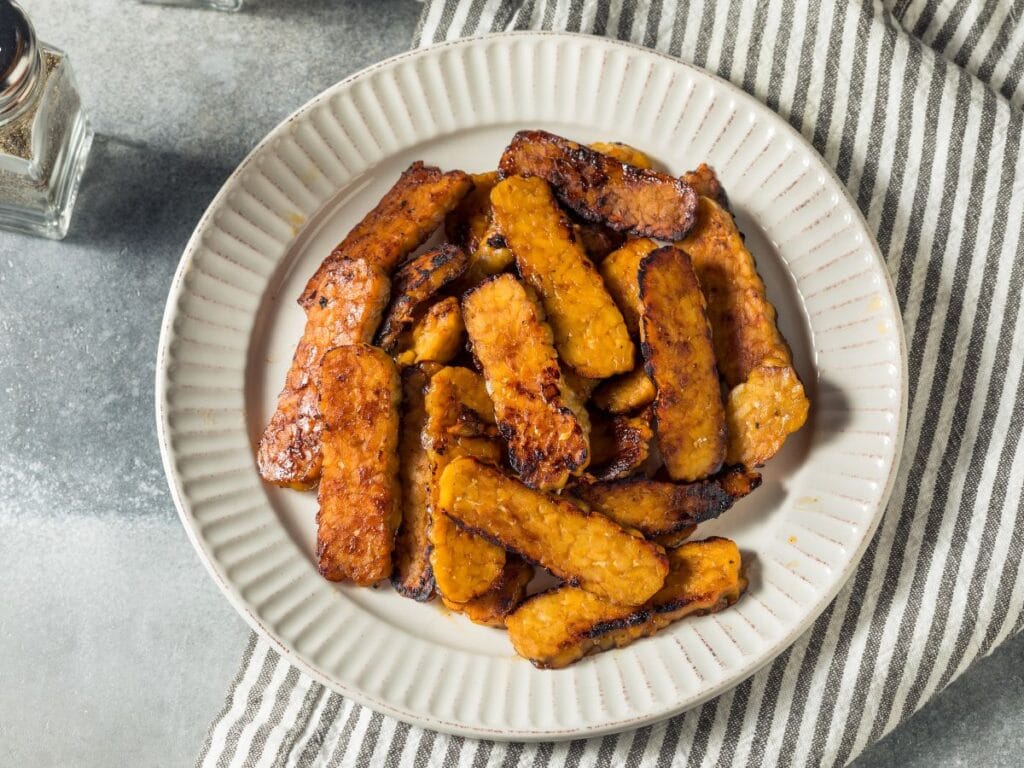
Tempeh triumphs in every category. Let’s compare it to regular bacon:
Protein performance: Tempeh provides 15g per 3oz serving. Regular bacon offers only 12g. That’s 20% higher protein content.
Fiber foundation: You get 9g fiber per serving. Meanwhile, bacon contains zero fiber.
Fat reduction: Tempeh has just 6g fat per 3oz. Compare this to bacon’s whopping 40g fat. That’s an 85% reduction in fat content.
Probiotic plus: Here’s the bonus benefit. Tempeh contains beneficial bacteria. These come from the fermentation process.
2. Carrot Bacon Craze: The Sweet, Smoky, Low-Calorie Crunch
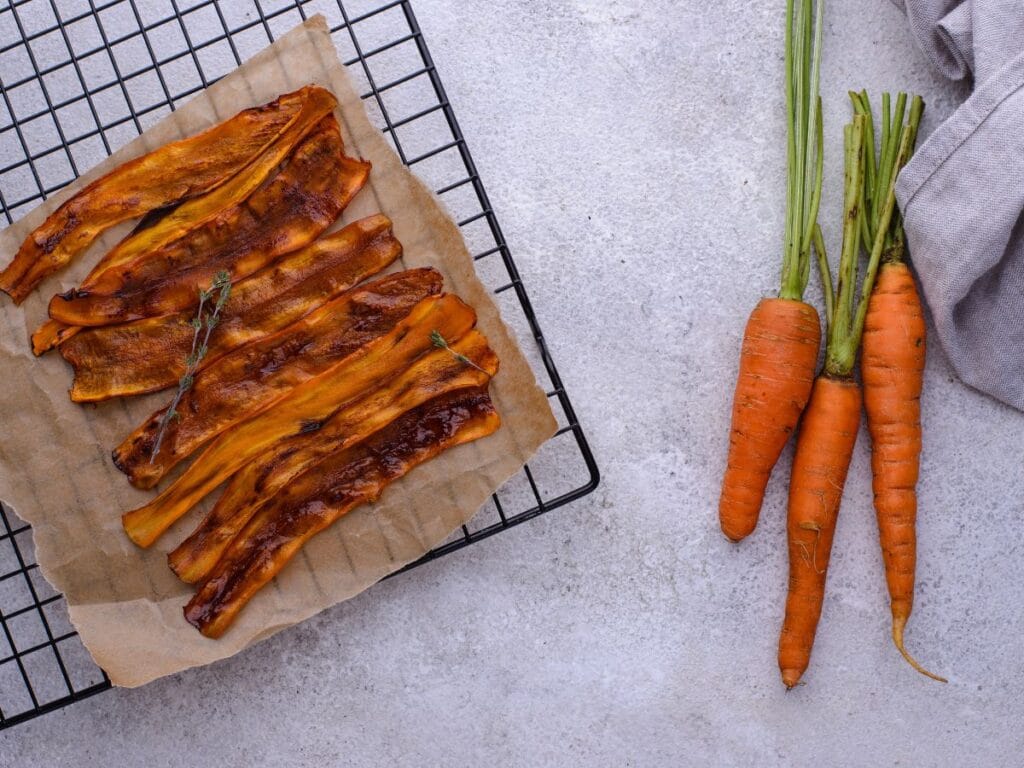
This clever plant-based swap transforms humble carrots into crisp, smoky strips of deliciousness—perfect for sandwiches, salads, or snacking. With just a veggie peeler and a few pantry staples, you’ve got bacon’s personality without its baggage.
The surprising benefits:
- Calorie cutter: Around 35–50 calories per serving vs bacon’s 540—over 90% fewer calories
- Fat fighter: Just 0.2–0.5g fat per serving, compared to bacon’s 9g—94% less fat
- Customizable crunch: Infuse with liquid smoke, maple syrup, paprika, soy sauce—make it smoky, sweet, or spicy
- Quick preparation: Thin strips bake in 10–15 minutes—easy and mess-free
Texture tip: Use a Y-peeler for even, thin slices and flip halfway during baking for the perfect crispy finish.
3. Elegant Eggplant Bacon: Antioxidant-Rich Alternative
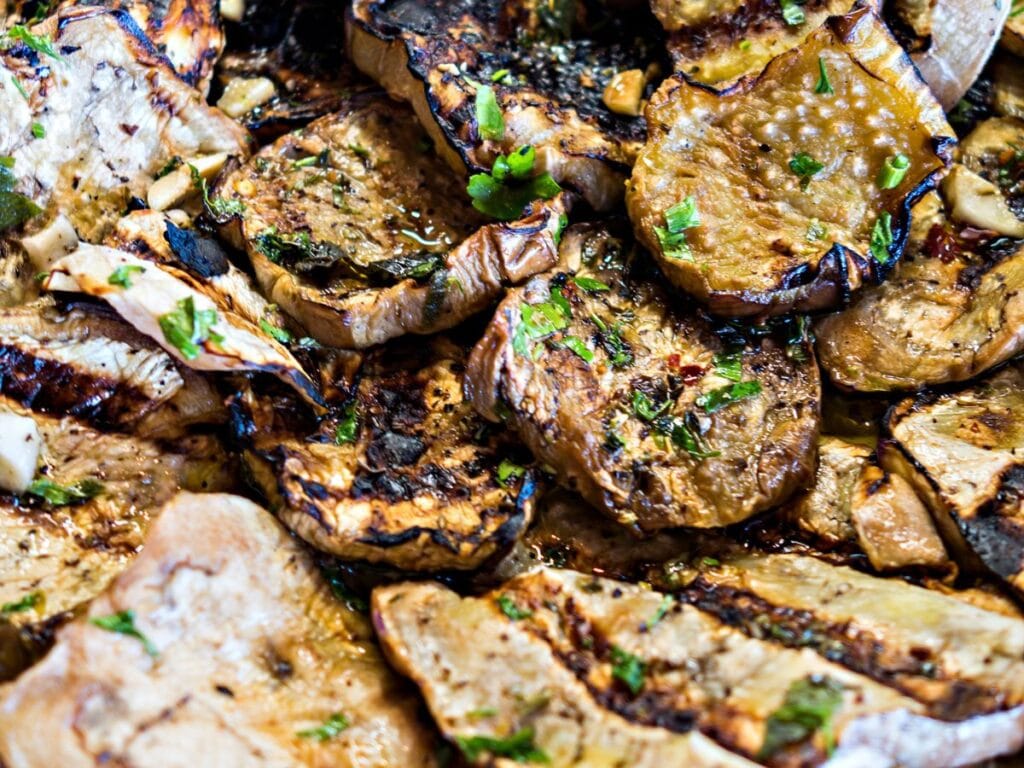
Thinly sliced eggplant transforms into savory bacon strips with impressive nutritional benefits.
Eggplant excels with:
- Calorie conscience: Just ~35 calories per serving versus bacon’s ~540 (93% fewer)
- Fat freedom: Less than 1g per serving versus bacon’s 9g (89% lower)
- Antioxidant advantage: Contains nasunin, a powerful brain-protecting antioxidant
- Versatile preparation: Works in sandwiches, crumbled on salads, or alongside breakfast classics
Preparation perfection: Slice eggplant paper-thin using a mandoline for the crispiest results, and don’t skip the salt-and-press step to remove excess moisture before marinating.
Conclusion
Switching to plant-based foods doesn’t have to be complicated or boring. With these easy vegan food swaps, you can enjoy tasty meals that support your health and the planet. Start small, experiment with your favorites, and watch how simple changes can make a big difference—both on your plate and beyond.

